

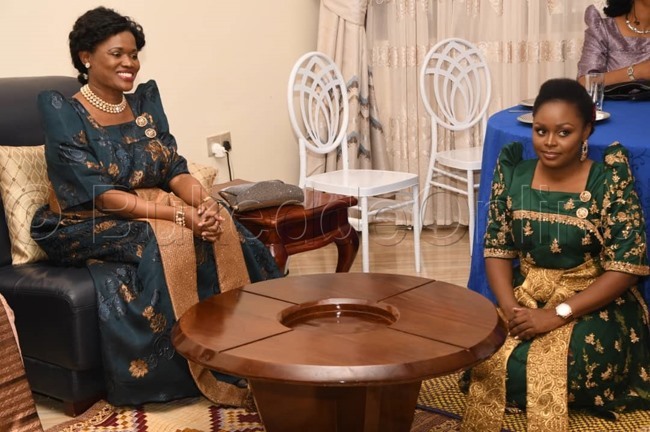 The Nnabagereka giving support to the Artiste as she kneels before her
The Nnabagereka giving support to the Artiste as she kneels before herAbavubuka mwenyigire mu bulimi - Kabaka awadde amagezi:
8th December, 2014
By Dickson Kulumba ne Paddy Bukenya

Kabaka ng’awuubira ku bantu be ku mbuga y’eggombolola y’e Buwama mu ssaza ly’e Mawokota e Mpigi ku Lwomukaaga ku mikolo gy’Abavubuka mu Buganda.
KABAKA Ronald Muwenda Mutebi II alagidde abavubuka okwongera okwegatta
beenyigire mu bulimi nga balima ebirime eby’ettunzi okusobola okwekulaakulanya.
Omutanda ng’ali ku mikolo gy’abavubuka mu Buganda ku mbuga y’eggombolola y’e Buwama mu ssaza lya Mawokota mu disitulikiti y’e Mpigi ku Lwomukaaga, yawadde abavubuka amagezi okukozesa ebifo ku masaza ne ku magombolola okukolerako emirimu egy’enjawulo egy’enkulaakulana
n’asiima abatandiseewo emirimu ne bayambako n’abalala okwebeezaawo.

Ente Omubaka Kenneth Kiyingi Bbosa (Mawokota South) gye yatonedde
Ssaabasajja ku Lwomukaaga.
Kabaka alagidde abavubuka okwekebeza Kabaka yakubirizza abavubuka okwekuuma:
“Omwaka guno tujjukiziddwa ensonga y’ebyobulamu. Abavubuka tusaanye okwekuuma nga tuli balamu, okwekebeza buli mwaka kubanga si kirungi okugenda mu ddwaaliro nga tumaze okugonda ate omuvubuka alina okulya obulungi.”
Katikkiro Charles Peter Mayiga yakunze abavubuka okukozesa emikisa Kabaka gy’abatee
reddewo; mu by’obulimi beekwate BUCADEF n’okuyingira Ssuubiryo Zambogo SACCO.
Omulamwa gwabadde; Omuvubuka omulamu ate nga mukozi ye nnamuziga w’enku
laakulana mu Buganda, era wano Minisita w’abavubuka e Mmengo, Henry Ssekabembe, we yategeerezza nga bammemba ba Ssuubiryo Zambogo SACCO bwe batuuse ku 1,500 nga kati balinawo n’obukadde 285.

Abamu ku Baamasaza ku mukolo gw’Abavubuka mu Buganda e Mawokota ku Lwomukaaga.
Omukolo gwetabyeko; ssentebe w’abavubuka mu Buganda, Richard Kabanda, Kayima David Ssekyeru, Katikkiro eyawummula Dan Mulika, sipiika wa Buganda Nelson Kawalya n’omumyuka we Ahmed Lwasa, Minisita Amelia Kyambadde, Omubaka Kenneth Kiyingi Bbosa (Mawokota South) ssaako baminisita b’e Mmengo, abakulu b’ebika n’Abaamasaza.
Abayimbi; Mathias Walukagga ne Fred Ssebbale be baasanyusiza abantu ba Kabaka.
Posted Sunday,1 st March, 2015
Before 1906, there was no banking institution in Uganda until November of the same year when the national Bank of India opened its first branch in Entebbe, and four years later it opened the first bank in Kampala, although it was later taken up to become Grindlys Bank.
The National Bank of India was followed by Standard Bank of South Africa Limited when on September 19, 1912, it opened its first branch in Kampala. And a few years later it opened another branch in Jinja.
Barclays
Barclays followed in 1927 when it opened two branches in Kampala and Jinja. In 1954 three more banks; Bank of Baroda, Bank of India and The Nedelandsche Handel-Maatschappij M.V (Netherlands Trading Society) opened in Uganda.
According to Saben’s commercial directory and handbook of Uganda, as early as 1949 the banking system had been established in Uganda but did not control much of the financial liquidity that was in circulation across the board in the country.
“Much of the money was controlled in the bazaars and other channels which were predominantly controlled by people of the Asian origin. These people played a key role in the buying of cotton.
However, areas where banks were non-existent, merchants in those areas played the part of the banks. This was through taking drafts in exchange for cash or physical items in exchange for hard cash,” Saben wrote.
By 1950, it was realised that to bring more Africans into the business there was need to provide them with credit. Unfortunately, the commercial banks at the time would not extend credit to Africans because of the nature of their securities.
Under Ordinance number 20 of 1950 the Uganda Credit and Saving Bank was created purposely to extend credit facilities to Africans with the aim of furthering agriculture, commercial building and co-operative society purposes.
On October 2, 1950, the bank was opened and by 1961 it had spread to places like Arua, Fort Portal, Jinja, Soroti, Gulu, Masaka and Mbale, taking only African deposits.
Building Society
Two years later, the first Building Society in Uganda was opened as a subsidiary of a Kenyan owned firm Savings and Loans Society Limited.
More financial institutions continued to open up in Uganda with Lombard Bank from Kenya, in partnership with Uganda Development Corporation, opening the Lombank Uganda Limited in 1958. It was this bank which first introduced the hire purchase system of shopping in Uganda.
It was not until 1966 that through an act of Parliament that Bank of Uganda was created. Prior to this, issues to do with money were handled by the East African currency board which had its head offices in Kenya.
OMUZIRO:NGEYE
AKABBIRO
KKUNGUVVU OR
EMMUNYUNGU
OMUTAKA
KASUJJA NKALYESIIWA
OBUTAKA
BUSUJJU
ESSAZA
BUSIRO
OMUBALA
Tatuula asuulumba busuuluumbi
Yazzeemu okuwera ng’Amasiro gano bwe galina okuggwa mu mbeera yonna n’agamba nti, “Nziramu okuwera nti tewali nsonga egenda kutulemesa kumaliriza mulimu guno. Enkuba ketonye, kibuyaga kaakunte, omusana ka gwake, tulina okumaliriza amasiro.”
Bino Katikkiro yabyogedde bwe yabadde alambuza Obuganda omulimu ogukolebwa ku Masiro e Kasubi eggulo ku Ssande n’asiima bonna abali ku mulimu era n’agamba nti omulimu guno gulina okutambuzibwa okusinziira mu mitendera.
Ssentebe w’olukiiko oluvunaanyizibwa ku kuzzaawo Amasiro, Al- Haji Kaddu Kiberu yategeezezza ng’okutusibwa kwa langi ebadde emaze ebbanga eddene ng’erindirirwa bwe kiguddewo essula empya mu kuzzaawo Amasiro gano.
Kaddu yagambye nti “ Essa kwe tutuuse, omulimu guno gusigadde mu mikono gy’abantu babiri ate bonna nga bataka; Kasujja ne Muteesasira era mubadde mugamba nti tubadde tutambudde mpola naye nange ngenda kubakanda ebyetaagisa ebirala okuli essubi, emmuli, amavuvume n’ebirala.
Omutaka Muteesasira Tendo Keeya yagambye nti ttiimu ye ey’Abagirinya yamaze dda okugitendeka era yeetegese okutandika omulimu gw’okulasa akasolya k’enju Muzibu Azala Mpanga ate n’oluvannyuma akwase Wabulakayole ( Omusige okuva ewa Kasujja), omulimu gw’okusereka.
“ Omulimu oguddako muzito era muzibu. Mu mbeera eno gugenda kutambula mpola kubanga eby’obuwangwa tebikubibwamu mavuunya n’olwekyo tulina okugendera mu mitendera,” Omumyuka owookubiri owa Katikkiro era Minisita w’obulambuzi, obuwangwa n’ennono Haji Muhamood Sekimpi bwe yagambye.
Langi ebadde erindiriddwa okuva e Girimani yatuusibwa wiiki ewedde nga kwajjirako omukugu era nga gulondoolwa aba kkampuni ya langi Peacock ng’olunaku lw’eggulo ( Ssande) baalaze abantu abaabadde e Kasubi engeri langi eno eyatereddwaako gy’egenda okutaasaamu Amasiro.
Allan Kibirige ku lwa Peacock yannyonnyodde nti, “ Langi eno eyamba okutaasa omuliro ne gutasanyawo Masiro okumala essaawa bbiri ng’abazinyamwoto bwe bajja. Mu ngeri
y’emu egenda kuyamba okuwangaaza enju eno.
Omuwanika w’olukiiko lw’Amasiro, Gaster Lule Ntakke yalangiridde ensimbi 5,019,700/- nga ku zino Pius Mugalaasi n’omutuba gwa Katulami e Kisunku mu ssiga lya Jjumba mu kika ky’enkima gwakulembera yaleeseeko obukadde buna. Ntakke yagambye nti ensimbi zino zigenda kusigala Kasubi okukola ku nsonga ez’enjawulo okuli amasannyalaze n’amazzi agatawaanya abagasulamu.
M/s Rema the Ganda Artiste has decided to introduce Dr Ssebunya as her next future husband after a long wait:
By the New Vision
14 November, 2019
The long awaited day is finally here. Artiste Rema Namakula is introducing her fiance Hamza Ssebunya at her parent’s at Nabbingo, Wakiso district.


 The Nnabagereka giving support to the Artiste as she kneels before her
The Nnabagereka giving support to the Artiste as she kneels before her
Moses Matovu the saxophone king
Moses Matovu is one of the most celebrated and influential figures in Ugandan music history. Renowned for being the band leader of Afrigo band, Matovu seems to age like fine wine but the increased responsibility to keep the band’s image glowing does not seem to slow him down, writes David Lumu.
Fifteen years ago when I first attended an Afrigo band performance, their home base was at Club Obbligato, then in Industrial Area, just a few metres away from the now defunct Club Silk.
Those days, Moses Matovu often shared the vocal duties with Charles Sekyanzi on the band’s classic hits such as Maria, Olumbe lw’Obwavu, Eneeyisa and Oswadde Nnyo, among others.
Matovu’s protégé, Don Canta, always provided the vocals on the Lingala segments of the songs Mpeddembe and Julie, plus several other rhumba classics.
Meanwhile, the legendary Mansour Bulegeya complemented Matovu’s saxophone duties when the latter had to sing or take a break. Even fabled Fred Masagazi, though not a member of the band, also used to chip in with his some memorable songs as well as medleys such as Twejjukanye.
Over the years, the band has seen a wide range of changes in their ensemble but most importantly, Afrigo remains as solid as it has ever been; the signature sound has not changed and they even have more variety in style to fuse reggae and pop sounds into their music catalogue. If anything, the band has continued to grow from strength to strength since its move to the new Club Obbligato along Bombo road as it endears itself to younger fans with its unique sound.

Unfortunately, the foursome of Sekyanzi, Masagazi, Bulegeya and Canta have since passed on, leaving Matovu as perhaps the remaining constant in those band roles. This also means that Matovu has had to embrace the role of multi-tasking to keep the band’s lofty heights. Today, if you happen to arrive early for an Afrigo performance anywhere, you will likely find Matovu, a drop-dead perfectionist, fine-tuning the sound of every band instrument with the mixer.
This tedious process sometimes takes him 30 minutes as he meticulously seeks to get the perfect sound for the fans. Then on stage, he is increasingly performing more than one task at the same time for sometimes as long as five hours.
For instance on the hit Maria, he performs the catchy saxophone intro before diving in with the vocals and later on in the song, he has to play the tambourine, something he finds exhausting as much as it is enjoyable.
“There are days I get drained because in the past, there was a variety of role-players,” Matovu says.
“But in life you cannot dwell on the past, especially on something you cannot bring back. I didn’t embrace covering up for their roles but it is something I have little choice of doing because in Afrigo, we have to play every song exactly as it should be, even if it means some of the band members multi-tasking.”
This is not to suggest that Matovu is doing it all alone; old Afrigo band faces such as Joanita Kawalya, Herman Sewanyana, Saidi Kasule, Rachael Magoola and Eddie Ganja are still around. And in the absence of the departed colleagues, he has drafted into the band several talented replacements such as trumpeter Adam Katongole, who is still trying to grow into the Sekyanzi element, and Prince Kazuno, a charming Congolese vocalist with a similar aura like Don Canta’s.
In fact, Kazuno’s voice is so tailor-made for the Lingala segment of Mpeddembe that one may think Amigo Wawawa had him in mind when he was composing the song back in 1995. A few weeks ago, Matovu celebrated his 70th birthday [June 19, to be precise] with a series of commemoration parties organised by different sections of fans.

Matovu, who has steered the band since 1977 when original leader Jeff Sewava left, continues to defy age both in appearance as well as in performance. This milestone, which also coincides with his 55 years in secular music, has won him several applauses of reverence from the band’s long-time faithful fans, but at the same time something to ponder about the future.
It goes without saying that as he ages, his powers may also be waning, especially with the increased responsibilities, but Matovu is not the kind to take a back seat.
“Many people wonder how I keep going or when I will take a back seat, but I have no answer because all I live for is music. I’m entirely devoted to music and only God knows how long I can go,” he says.
“I’ve trained quite many musicians to one day take over from me but unfortunately, many have failed to live up to the high standards of the band and dropped off. There is a standard we set in Afrigo that we cannot compromise on…that’s why sometimes I have to play different roles.”

On whether he may one day have to comfortably sit back and watch the band perform without him on stage, Matovu is optimistic but unsure whether it will happen.
“Music is a calling to me and as long as I have the strength to perform, I will keep going. This band will outlive me because there are enough singers and instrumentalists, but quitting music is out of my plans,” he says.
Indeed, Matovu is already working on a new album, his first in almost a decade. However, he remains cagey.
“I don’t want to divulge everything at the moment but just know we are dropping something big before the end of the year,” he says.
For someone whose music career started at the age of four as a chorister in Namirembe cathedral choir, spells in Crane band and later Afrigo, there seems to be nothing to stop his musical calling. It is all he knows.
lumudavid@gmail.com

The radio is housed in a small container
The unreliability of the Uganda Broadcasting Cooperation (UBC) radio station in Moroto district has shocked President Yoweri Museveni.
Jones Othieno alias DJ Jones, a staff at the station told the president at Morulinga State Lodge in Moroto that the station, which serves Karamoja region, only operates twice a month.
Othieno, who utilized the opportunity of question time, revealed to the president that the radio had failed to serve its purpose in the region due to technical problems.
He urged the president to intervene in the situation. President Museveni laughed at the revelation and pledged to follow up the matter.
"I’m sorry to hear about UBC which is totally seasonal. A radio is supposed to be daily not seasonal. That it only comes on twice every month - that one now is something new because radio is supposed to be everyday, otherwise how will people know which date. I’m very happy you told me, I’m really going to follow it up." said Museveni.
The radio was commissioned by the president in March 2015 and operates in Singila village. The station operates in a small container in an open compound, which is littered with cow dang.

All the radio equipment including the transmitter are in the same container. UBC Radio, also known as Totore mainly operates when there is electricity.
On many occasions, government officials, who are supposed to sensitize residents on government programs, opt for private radio stations in town due to the poor status of the UBC station.
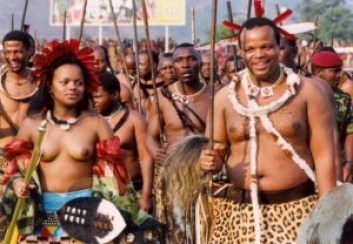 King Mswati III and his daughter, Princess Sikhanyiso.
King Mswati III and his daughter, Princess Sikhanyiso.The African King Mswati III, the absolute monarch of Swaziland, has demanded severe public spending cuts across his impoverished kingdom.
But, the King who wore a watch worth US$1.6 million and a suit of diamonds weighing kg 6 at his 50th birthday celebrations last year shows little sign of making any personal sacrifice. Days before the celebration he had taken delivery of his second private jet. This one, an Airbus A340, cost US$13.2 to purchase but with VIP upgrades was estimated to have cost US$30 million.
Meanwhile, seven in 10 of the estimated 1.2 population of Swaziland live in abject poverty on income less than the equivalent of US$2 per day (about E25).
The King has 13 palaces and fleets of top-of-the-range Mercedes and BMW cars. He and members of his extensive Royal Family (he has had at least 15 wives) live opulent lifestyles and are often seen in public wearing watches and jewels worth hundreds of thousands of dollars.
The King made his call for cuts at the annual opening of the Swazi Parliament on Friday (8 February 2019). He said the kingdom’s spending had ‘surpassed sustainable levels’ and government debts were increasing. The countries financial reserves were falling and there was little economic growth. He warned that taxes collected in Swaziland would not be enough to pay the bills.
King Mswati said there needed to be ‘very stiff measures and concerted effort’ to cut expenditure. He added, ‘hard decisions will have to be taken, sacrifices need to be made and unconventional methods of reducing expenditure need to be pursued’. He did not say what these ‘unconventional methods’ might be.
In his budget speech in March 2018 Finance Minister Martin Dlamini said Government owed E3.1bn (US$230 million) in total to its suppliers for goods and services.
Swaziland has been in financial meltdown for many years under a succession of governments handpicked by King Mswati. He chooses the Prime Minister and cabinet ministers; political parties are banned in Swaziland and cannot take part in elections. Across Swaziland at present some schools are closed and public hospitals and clinicshave run out of food and vital medicines because the government has failed to pay suppliers.
The King’s demand for others to make sacrifices is not new. He has made similar calls at the opening of parliament in recent years. However, he and the Royal Family have failed to make any sacrifices of their own.
The extent of the King’s wealth is a closely-guarded secret. However, in 2009 Forbesmagazine estimated that the King himself had a personal net fortune worth US$200 million. Forbes also said King Mswati was the beneficiary of two funds created by his father Sobhuza II in trust for the Swazi nation. During his reign, he has absolute discretion over use of the income. The trust has been estimated to be worth US$10 billion.
In August 2014 the Sunday Times newspaper in South Africa reported King Mswati personally received millions of dollars from international companies such as phone giant MTN; sugar conglomerates Illovo and Remgro; Sun International hotels and beverages firm SAB Millerto. He continues to receive money from these sources.
The King receives income each year from Tibiyo Taka Ngwane, which is a an investment fund with extensive shares in a number of businesses, industries, property developments and tourism facilities in Swaziland.
The King is the sole trustee of Tibiyo. Neither the King nor Tibiyo pay tax.
Money generated by Tibiyo is meant to be used for the benefit of the nation, Tibiyo in fact channels money directly to the Royal Family. A report from the United States State Department in 2016 said, ‘Tibiyo is run as a private equity investment fund for the benefit of the King and the royal family.
It added, ‘This fund is not subject to government or parliamentary oversight.’
According to the Tibiyo 2016 annual report it held assets worth E1.8 billion.
There is a shortage of public and private toilets all over the expanding city of Kampala.
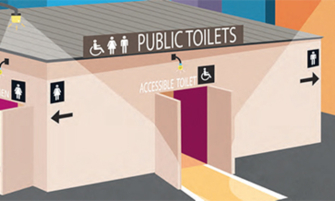
The standard public toilet structure in urban areas in Africa.
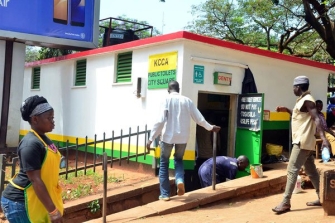
KCCA public toilet at City Square, Kampala. This African city has suffered annual outbreaks of typhoid and cholera and other communicable diseases, all linked to poor sanitation, costing lives and wealth. FILE PHOTO
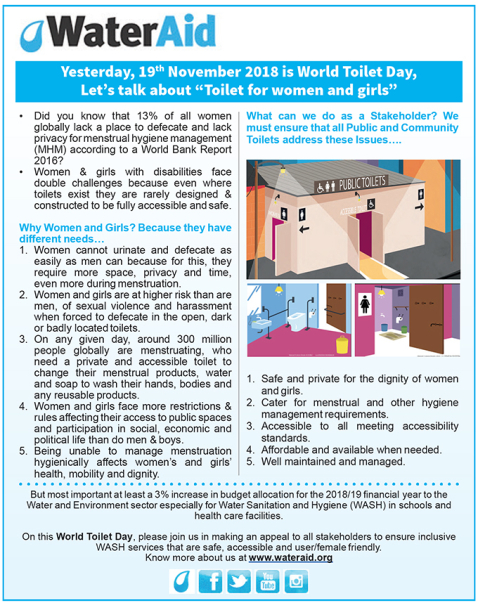
20 November, 2018
By Amos Ngwomoya
In downtown Kampala, there is a cacophony of activity and thousands of humans mill in the fast-paced business hubs with urgency in their steps that creates tension and disorder.
If it is not a shoe dealer loudly smacking sandals on Namirembe Road to arrest the attention of potential buyers, it is a taxi tout menacingly beckoning commuters or a porter with baggage on the upper back angrily hollering to everyone to steer clear.
In the civic area, suited men and high-heeled women straddle with aura of sophistication. The city dwellers fan out to bars and eateries for meals that they patronise.
City Hall estimates that the day-time population of Uganda’s only capital at 4.5 million, dwarfing the resident population that the 2014 National Housing and Population Census puts at the 1.5 million.
The latter is the figure upon which the government and City Hall plan for and allocate resources, meaning social services in the capital are overwhelmed when the fleeting day-time population rises three-fold. A huge population too births diverse problems. And for Kampala, these range from political quarrels to broken infrastructure, rising crime, clogged drainage and flooding of streets during downpour as well as poor sanitation.
According to Kampala Capital City Authority (KCCA) Spokesman Peter Kaujju, one per cent of city households, which grossed 414,400 according to a 2014 census, have no toilets or latrines. The problem of inadequate sanitation facilities, which in the capital’s case directly affects 4,144 households, is compounded by public toilets that are few and far between.
There are only 16 of them to serve the city’s burgeoning population. The closest are five to 10-minute walk apart while anyone accessing the city from the east will, after passing Nakawa Market, find another public toilet only at Centenary Park, some three kilometres away. These distances inconvenience when a person is in urgent need to answer nature’s call.
In September, last year, the then Arua Municipality Member of Parliament Ibrahim Abiriga, who was assassinated in June, became a poster child of urban nuisance after an unknown person captured him on a cellphone camera urinating on the perimeter wall fence of the ministry of Finance headquarters in the inner-city.
Abiriga, until then known as a mascot of the ruling National Resistance Movement (NRM) party for his infatuation with yellow attire, later said he had drunk Coke and was under immense pressure to urinate yet there was no nearby public toilet at nightfall. The City Hall convicted and fined him Shs40,000, making him the most high-profile politician in modern Uganda to be punished for answering nature’s call at the wrong place. Abiriga was no exception, and his predicament mirrored the widespread problem of thousands.
It also was an indictment of City Hall obliged under the KCCA Act to, among other things, provide public lavatories and urinals as well as sanitary services for the removal and disposal of all kinds of refuse and effluent.
Dr Charles Niwagaba is a lecturer at Makerere University’s department of civil and environmental engineering and noted in an interview for a story that this newspaper published in March, this year, that 46 per cent of Kampala’s faecal sludge remains uncollected.
As a lead consultant for Kampala Feacal Sludge Management (FSM), a Bill and Melinda Gates Foundation project for improving sanitation in the city, Dr Niwagaba said the unpicked human waste ends up in either side drains or indiscriminately dumped in the open. The problem is more manifest in the slums and central business district where some residents defecate in polythene bags, which they call ‘flying toilets’, which they lob from their homesteads into open areas.
In Kampala’s case, Makindye, which is the largest of the five divisions, has no public toilet, an irony officials cannot explain. KCCA says it is not sitting on its laurels and has launched a home-to-home hygiene campaign dubbed Weyonje, a Luganda word for ‘be clean’.
There is a plan to fast-track construction of more public toilets.
“We are aggressively moving to build more through partnerships. The plan is to build 200 toilets by 2020 in markets, parks and some vulnerable communities and they will be modern toilets at least in every Ward,” he said.
KCCA would not disclose the cost of the planned project, whether the money is provided in its budget or when actual construction would commence.
A senior government engineer said a modern toilet, with extensive plumbing, tiling and water piping, could cost anywhere between Shs5m to Shs7m per stance.
There are up to 2.4 billion people in the world without access to basic sanitation services such as toilets or latrines, according to the United Nations Development Programme (UNDP). Clean water and sanitation is one of the seventeen Sustainable Development Goals that the United Nations General Assembly adopted when Uganda held its rotational presidency, making the country’s capital’s sanitation situation of interest even on a global scale.
In a May 2018 Uganda Sanitation Diagnostic Study Report for World Bank titled, Reviewing National Sanitation to Reach Sustainable Development Goals, the authors; Jim Gibson, Kathy Eales and Chris Nsubuga-Mugga, note: “Good sanitation matters for many reasons, but particularly for human dignity, public health, and environmental protection, and especially water.
The consequences of poor sanitation include water pollution, cholera, typhoid, stunting, lowered immunity to malaria, tuberculosis and human immuno-deficiency virus (HIV) arising from worm infestations, and girls not completing their schooling because of inadequate provision for menstrual hygiene management.”
And Kampala has suffered annual outbreaks of typhoid and cholera and other communicable diseases, all linked to poor sanitation, costing lives and wealth.
Traders, KCCA fight over toilets
Owners of commercial buildings in Kampala have rejected President Museveni’s proposal for them to open toilets for free use by tenants.
The President made the proposal after tenants bombarded him during a tour of the inner city that business had become costly due to multiple tax obligations yet demands by landlords for additional pay for toilet use, in addition to high rents, was chipping away profits. The property owners charge tenants and their customers Shs200 to Shs500 per use of the facility. Land lords, however, say the toilet levy is necessary to keep it clean and usable.
Kampala Capital City Authority (KCCA) joined the fray by directing the landlords to open the sanitation facilities for free use by both tenants and members of the public.
Rather than oblige, the property owners have challenged KCCA to build more public toilets instead of downloading its responsibility on them.
“Let them build public toilets in the city instead of issuing useless notices. This directive can’t work because these are purely commercial buildings,” Mr Mansoor Matovu alias Young, who claims to own 37 buildings in the capital, said.
Mr Godfrey Kirumira, the chairperson of city landlords, wondered why City Hall was in haste to enforce the directive without engaging landlords.
“It’s practically impossible and we have told them to halt implementation because we also have our reasons why we are protesting it. Let them consult us first,” he said.
The landlords’ argument is backed by Dr Amin Tamale Kiggundu, an urban and regional planning scholar, who says that KCCA ought to invest more in public toilets.
“I think this public service is not easy to provide especially in cities of developing countries. Those who are charging a fee are right because they are providing a service which should have been provided by KCCA,” Dr Kiggundu said.
He says that it’s important to foster Pubic Private Partnerships (PPP) whereby government supports investors in constructing many public toilets in the city and pay them some money before they are opened to the public.
Kampala currently has only sixteen public toilets, most located near markets, worship and public open spaces.
Janitors at the facilities do not keep record of users and, as such, precise number of urban dwellers who use the public toilets each day is difficult to compute.
Mr Ismael Lubega, one of the four workers at the Centenary Park public toilet public off Jinja Road, estimates that at least 1,000 people visit the facility each day.
“The numbers keep growing,” he said.
They provide 200 rolls of toilet paper for users every week, costing upwards of Shs100, 000, excluding expenses on water and detergents. This is the kind of anticipated expenditure that landlords are battling to avoid incurring.
Mr Yasiin Ssematimba, the chairperson of Kampala Operational Taxi Stages Association (Kotsa), said that whereas the toilet in the Old Taxi Park was meant to be for free, the owner of the land on which it was constructed took over its management after challenging KCCA in court.
The predecessor of KCCA, then known as Kampala City Council or KCC, was charging fees to access city public toilets. Ms Jennifer Musisi scrapped off the charges in 2012, one year after she became the executive director under the new KCCA Act.
Mr Nasser Ntege Sebaggala, the former Kampala mayor, said that KCC decided to privatise the public toilets because of the budget deficits. Users would part with Shs200 each time one visited a public toilet.
Toilet scarcity effect
Kampala has suffered annual outbreaks of typhoid and cholera and other communicable diseases, all linked to poor sanitation, costing lives and wealth. The dwellers are worried that if the issue of sanitation is not handled well, the situation could worsen.
WHAT THE LAW SAYS...
KCCA ACT. Third Schedule, Part A, of the Kampala Capital City Authority Act, provides, among functions and services for which Kampala Capital City Authority is responsible.
1 (m) public lavatories and urinals; and, (s), sanitary services for the removal and disposal of night soil, rubbish, carcasses of dead animals and all kinds of refuse and effluent;
7(3) The Ministries responsible for health and environment shall oversee the public health and environment matters, respectively, in the capital city.
Locations
City Square
This is a meeting place for many people who usually take a rest in the available open space. It’s also a convergence centre of many taxis which shuttle passengers to different locations.
Nakawa Market
The two toilets at Nakawa Market serve over 3,000 market vendors according to the Nakawa division mayor, Ronald Balimwezo Nsubuga.
Entebbe Road
The public toilet majorly serves passersby, but it also serves vendors from Nakasero market due to its proximity.
Watoto Church
The public toilet on Bombo Road is just opposite an open space where many people gather to take a rest. It’s also used by some people who attend Watoto Church.
Centenary Park
The public toilet in this vicinity is strategically located along Jinja Road, just after the traffic lights. It’s also used by revelers who usually visit the different hangouts in the park.
Usafi Market
The two public toilets in Usafi serve 4000 vendors in the market according statistics from KCCA’s directorate of gender under which markets fall.
Computations
The distances and time between these places were computed by Google.
Residents’ take on public toilets > With Stephen Otage
“It is unfortunate that the public toilets are mismanaged by whoever is mandated to manage them. I would recommend some fee to be levied on usage for purposes of sustainability to keep them clean,” Harriet Komuhimba, Woman Councillor
“I have never used a public toilet for hygiene purposes and I would not recommend anyone to although I pass past many everyday because some people are sick and they do not care about how they dispose off stuff,” Samson.
“They are essential. Unfortunately, I have never used them. I believe they should be paid for because by doing this, the people who keep them are motivated to keep them clean,” Gloria Amutuhire, mental health worker
“I have used them about three times but most of them are in bad shape. Where you are supposed to flush, instead they give you a dirty bucket to scoop water from a drum. The tiles are peeled off,” Edward Isabirye, businessman
“In Uganda, I have not used them but back in Kenya, they are managed by the city council and they are very clean and neat. They charge Ksh20, which is used for buying toilet tissue, water and hand washing soap for users,” Dorcus Odiambo, hotelier
“I have used them once but their hygiene is worrying. Often, you do not find toilet tissue, there is no water and they do not operate for twenty-four hours. Generally, it is not a recommendable place, except for extreme need,” Ali Lukwago, businessman.
Real African culture:
14 September, 2018
Latin dancing as Buganda dancing:
https://www.youtube.com/watch?v=Nwj6ucaS98Y
Added 11th February 2018

Minisita w'Amawulire e Mmengo, Noah Kiyimba ng'abuuza ku Musika wa Maliba Mugerwa (mu katono) nga ye Joseph Lukwago. Olumbe lw'omugenzi lwabaddewo nga February 10,2108 ku kyalo Lunene mu ggombolola y'e Mpenja- Gomba. Ku kkono bebakulembeze e Gomba.
MMENGO esabye gavumenti eyongere amaanyi mu kunoonyereza ku bakola ettemu ku bantu ensangi zino ekintu ekikuumidde eggwanga mu kutya era nga kyolekedde okuzing'amya enkulaakulana.
Bino byabadde mu bubaka Katikkiro Charles Peter Mayiga bwe yatisse minisita w’ebyamawulire era omwogezi w’Obwakabaka, Noah Kiyimba mu kwabya olumbe lw’omugenzi;
Godfrey ‘Hassan’ Mugerwa Maliba,
ku kyalo Lunene mu Muluka gw’e Nkoma e Mpenja- Gomba ku Lwomukaaga February 10, 2018 n'agamba nti Bannayuganda batambulira mu kutya nga tebamanyi bye bakola.
“Tusaba gavumenti ensonga y’okutta abantu mu ngeri y’ekyeyonoonere ekitwale ng’ekikulu, ekole okunoonyereza okw’ekikugu kituyambe okuzuula abali emabega w’ekittabantu. Okugeza e Lwengo abantu baabalaalikanga misana ttuku ate ne bajja ne mu bitundu ebirala bwe batyo. Kati omwaka guweze bukya munnaffe ono Maliba attibwa naye poliisi tevangayo na kyonna kye yazuula ku kufa kwe era tukyagitunuulidde nkaliriza eveeyo n’ebitutuusa ku ani yamutta,” Kiyimba bwe yatuusizza obubaka bwa Katikkiro.
Mu lumbe luno, Kiyimba mwe yategeerezza abakungubazi nga Kabaka bwe yasiimye okuweerera abaana ba Maliba okuli; Joseph Lukwago (eyamusikidde) ne Sharuwa Namuli okutuusa lwe balifuna ddiguli era abantu ne bakubirizibwa okunyiikira okusomesa abaana nga beeyambisa bbasale Obwakabaka ze bwateekawo.
Maliba eyali omutandisi w’ekibiina ky’abavuzi ba pikipiki eziwerekera Kabaka ekiyitibwa Kabaka Mwenyango yasangibwa ng’attiddwa nga February 4, 2017 ng’omubiri gwe gugudde okuliraana essundiro ly'amafuta erya Kobil ku luguudo lwa Bombo nga tonnatuuka ku bitaala by’e Wandegeya.
Ku lw’ekibiina kya Kabaka Mwenyango, ssentebe omuggya, Ismail Mboggoli yeebazizza Obwakabaka olw’okubakwatizaako mu mbeera ey’okusomoozebwa gye babaddemu n’okubakwatizaako nga bategeka omukolo guno.
Omukolo gwetabiddwaako omwami w’eggombolola y’e Mpenja saako n’omukiise w’e Gomba mu Lukiiko lwa Buganda nga bonna basabye abasigadde nga balabirira abaana okuli Ssenga Sandra Namuddu okubakuliza mu mpisa ennungi.
Nb
Buganda tejja nakamu kufugibwa bwetyo! Eyo si Civilization omuzungu gyeyatusanga nayo nga bajjajja baffe bagigoberera obukubirire mu nonno zabwe
Ssematteeka akakasa atya? Nti no bwemulaba nga omufuzi wa Uganda aganidde mubuyinza awatali kusiima kwa bantu ba Uganda, mukwate emundu mutingane okutuusa omufuzi oyo bwanadduka nga ava mubufuzi!
Ebivudde mukusirikira okuttibwa kwa banaffe kakati emyaka giweze 50 bukya Buganda yefuga teri atabimanyi. Era asinga okutta abantu yawangula entalo za wano e Buganda, nga ne Ssematteeka wa Uganda bwakakasa.
Kirabika kyeere nga yo governmenti ya wakati efayo nyo okusasira nokuziika abafu okusinga okufayo okukuuma abalamu! Kibi nyo.
Tuwulira governmenti eno teyagala nakamu abantu abakuma omuliro mubanabwe bwebesanga nga bagudde mubuzibu deka busa. Kiba nga okugamba nti kumenya mateeka okwekubira enduulu eri balirwaana wano mubyalo e Buganda singa wesanga nga ogudde mumutawaana.
Abaganda tunamala kugwawo Sebo Kattikiro olyoke wevemu OKULAGIRIRA(oba okukuma mu muliro) governmenti yawakati okufayo eri abafiirwa abantu babwe nebintu byabwe olutatadde wano e Buganda?
Added 2nd December 2017
OMUSERIKALE eyatomeddwa ababbi e Nakuwadde n’atwalibwa mu ddwaaliro e Mulago ng’ali bubi, atandise okutereera.
James Alele 36, omuserikale ku poliisi y’e Nakuwadde ye yawonye okufa oluvannyuma lw’ababbi abaabadde babbye emmotoka ey’ekika kya Premio UBA 245C be baabadde bagoba okukyusa emmotoka ne babatomera n’amenyeka amagulu ate gwe yabadde naye, Joseph Wafula n’afiirawo.
Alele ng’ono yasangiddwa mu ddwaaliro ly’e Mulago yagambye nti amagulu gombi gaamenyese.
Yagambye nti babadde e Nakuwadde ku poliisi ne beekengera emmotoka ya Premio UBA 245C eyalabise ng’ey’ababbi nga badduka okuva ku kkubo ly’e Nakuwadde okudda e Bulenga ku lw’e Mityana ne bagigobera ku bodaboda.
Agamba nti bano bakyusiza emmotoka ne babatomera n’ekigendererwa eky’okubatta era Joseph Wafula ayambako poliisi okulwanyisa obumenyi bw’amateeka n’afiirawo, ye yamenyese amagulu n’atwalibwa mu kalwaliro e Nakuwadde oluvannyuma n’atwalibwa e Mulago kati gy’ajjanjabirwa.
Yayongeddeko nti awulira ennaku kubanga alina abaana bana n’omukyala abali mu kyalo ky’e Amulata b’alina okulabirira kyokka tamanyi oba anaawona amagulu n’asobola okuddamu okukola. Ate bo ababbi baakwatiddwa ne baggalibwa ku poliisi y’e Bulenga oluvannyuma lw’aba bodaboda nga beegasse wamu n’abatuuze b’e Nakuwadde okubagoba okutuusa bwe baabakutte.
Nb
Wano wenkubiriza abafuuse ababbi munsi eno enzibu bweti. Mulekerawo naye mutwegateko wano e Buganda nga bwekyali ku President Lule, tulabe bwetulwanyisa obufuzi obumbula obugude munsi nyaffe wano e Buganda
Abatuuze be Nakuwadde ne Bulenga mwebale kukolera awamu okutaasa emotoka eyabbiddwa kukyalo kyamwe. Ffe eno kukibuga Kampala ababbi batubba ko emmotoka nga bwebagala. Ate no nga abantu kukibuga batunula butunuzi tebafayo.

Pathetic. Heaps of garbage at Nkumba dumping site in Bukolwa Village, Nkumba Parish in Entebbe municipality. There are growing concerns that Wakiso District lacks proper waste management and disposal system, which has forced residents and manufacturers to dump waste in open places and drainage channels. PHOTO BYJOSEPH KIGGUNDU
WAKISO. Wakiso District is heading for a health disaster due to lack of a proper solid waste management and disposal system.
Currently, the district has no landfill. The only known refuse management facility is at Bukolwa Village, Nkumba Parish in Entebbe municipality, which is not appropriately managed with waste dumped in the open.
“The rest of the district does not have an acceptable waste management system. There is indiscriminate dumping-in wetlands, bushes and even along major roads,” says Ms Edith Nakatudde, the district physical planner.
This has heightened fears that absence of a gazetted landfill in the district may cause diseases associated with poor garbage disposal like dysentery and cholera.
Ms Nakatudde says garbage generated in the district is haphazardly collected, stored, transported and indiscriminately disposed of.
“Even in certain areas where there are garbage skips, they are not utilised by residents, while in many places, there are no skips,”she adds.
A physical planning report compiled by Savimaxx Limited, a private consultancy firm, pins some private garbage collectors of collecting fees from households but end up dumping waste in illegal places.
“This problem is more serious in Makindye/Ssabagabo, Kira, and Nansana Municipalities and in all the town councils in the district,” the report says.
Indiscriminate dumping
Due to lack of a well gazetted landfill in the district, residents, manufacturers and the business community have resorted to indiscriminate dumping of waste in wetlands or in open drainage systems while certain backyards and road sides are filled with refuse.
Besides, there is also poor disposal of human waste, especially in congested areas or slums.
As a result, people’s health in the area is at greater risk.
Despite Kiteezi dumping site being located in Wakiso, garbage generated within the district is rarely taken there because it is managed by Kampala Capital City Authority.
Report
But Savimaxx Limited report warns that the management conditions of Kiteezi landfill do not qualify it to be called a landfill, but a vast dumping ground with a lot of associated environmental challenges, which need to be seriously addressed.
“As a result, several problems have resulted at Kiteezi dumping site such as, pollution of drinking water in surrounding settlements by leachate from the garbage, fresh air pollution due to the stench, heavy use of the dusty road to the landfill site by lorries carrying solid waste usually not secured by nets leading to dust pollution and dropping of unsightly garbage on the roadside and constant breakouts of respiratory infections, dysentery, cholera and malaria in the environs of the dumping site,” reads the report in part.
Mr Moses Ssebakijje, a resident of Kasangati Town, says the prevalence of haphazard dumping of waste everywhere in the district is a clear manifestation that residents are headed for disaster. “We can blame our leaders, but we have not also played our part, we simply dump garbage anyhow,” he says.
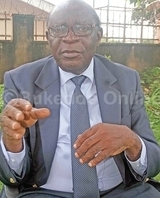
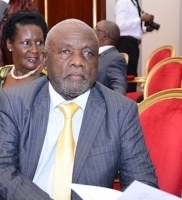

Above photo are some of the current senior leadership in the Kingdom of Buganda, Uganda.

Mr Ntege (2nd right) walks out of Mubende Court with well-wishers. Photo by Josephine Nnabbale
BUGANDA STATE, MUBENDE-The Chief Magistrate Court in Mubende has dismissed the assault case against Mr William Ntege aka Kyuma kya Yesu and set him free.
Mr Ntege, a former journalist attached to the defunct WBS Television was arrested after allegedly assaulting Kasanda South Member of Parliament, Mr Simeo Nsubuga.
The incident occurred at Buwekula County Headquarters, Mubende Municipality, where the people of Buganda were celebrating Kabaka Mutebi’s 24th coronation anniversary, on July 31.
Despite the ongoing country-wide strike by judicial officers, Her Worship Hellen Ajio stated that she could not allow Mr Ntege remain behind bars yet the Directorate of Public Prosecutions had informed court that they wanted to withdraw all charges against him.
”I have dismissed this case because the key witness in the case, Mr Simeo Nsubuga has failed to turn up in court as previously notified,” Ms Ajio said on Friday.
After being acquitted, Mr Ntege said he has no personal grudge against Mr Nsubuga but he is opposed to people who are trying to promote the scrapping of Article 102 (b) from the Constitution.
The Article bars people who are above 75 years of age from contesting for presidency.
Mr Nsubuga whose constituency is in Mubende District, is one of the National Resistance Movement party politicians who have openly supported the scrapping of the age ceiling for presidential candidates.
The scheme is being interpreted by some people as a ploy to allow President Yoweri Museveni, 73, who has been president for 31 years, to contest again for the top job in Uganda in 2021.
Mr Ntege said: “I am just grateful that there are so many people who share my stand and I pledge to continue with the activism of protecting Uganda’s Constitution.”
Drama ensued outside the court compound when Police bundled Mr Ntege into a waiting police car.
Mubende District Police Commander, Mr Patrick Byaruhanga said they wanted to ensure Mr Ntege’s safety.
“We are going to transport him to Mpamujugu Swamp that separates Mubende and Mityana districts and let him go,” Mr Byaruhanga said.
Daily Monitor learnt that police wanted to stop Mr Ntege and his supporters from staging a victory march in Mubende Municipality.

The Modern Wireless Phone
Added 13th March 2017
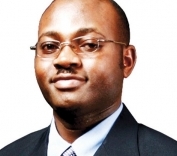
By Deo K Tumusiime
I have been doing a backtracking soul searching survey and have come to a realization that Ugandans have over the years, slowly but surely lost their basics in life.
The whirlwind illusion of modernisation (development), has detached many of us from what used to be cheaply our very own, and now everyone must pay a hefty price to wear a foreign identity, and pay even much more to sustain it. Here’s a nutshell comparison between what our true Ugandan identity used to be, and where we currently are:
Natural water vs bottled water: Even if you’ve not been to a science class, you will appreciate that natural spring water fresh from the ground, is simply incomparable to what we have as bottled water today. Served from a Ugandan clay pot with its natural minerals intact, the deep refreshing tinge of spring water is second to none. With its never ending supply, spring water comes at zero price. If our grandparents drew life from it, why not us?
Language: Uganda is a very rich country linguistically. With about 20 languages spread across the different regions, very few countries can boast of such wealth. But what is the situation today? You must pay money to learn English as a compulsory subject instead of speaking your language for free. In fact, in school we were punished for speaking our Ugandan languages. Today, in addition to English, other foreign languages; French, German and Spanish have been drafted into our curriculum. Those who speak a bit of these languages feel sweet on others, when they should ideally be lucky to master any of the likes of Luo, Lugbar, Langi, Acholi, Karimojong, the 4Rs, Luganda, Swahili and so on, languages that they need for immediate purpose.
Dental care: I have lived in a Uganda where we cleaned our teeth using a piece of charcoal, and they turned spotless white. If you have visited a dentist to have your teeth cleaned, you will agree with me that dentists clean teeth using not a tooth brush but metals to rid us of the tartar. A tooth brush lacks that abrasive effect necessary to effectively clean a tooth surface especially once tartar has built up. Charcoal does it 10 times better. Of course the immediate worry is the “dirt” from charcoal, but to focus on this is to forget that the best things in life actually come from dirty. In any case, charcoal stains not, and can easily be cleaned with ordinary water.
Our Ugandan huts: There’s a time when the number of people using iron sheets for roofing was countable. In the rush for modernization, the huts have since been dismantled as backward. But with a hut for housing, all the materials used were readily available free of charge, and there was no need for specialized labor as everyone could build. Today we have many homeless people, their minds stuck in the wishful desire to erect a so-called decent house. Need I list the benefits of huts? They are the coolest form of housing in times of hot weather, and they are noise free in times of rain, guaranteeing a peaceful sleep.
Decentralisation, my foot! I have also lived in a Uganda, where residents of every village worked alongside their leaders to fix their roads. Community development was everyone’s responsibility. However, with the coming in of the exotic concept of decentralization, this community role was made the exclusive responsibility of a certain body called Local Government, often completely detached from the locals. In the end, civilized Ugandans drive over potholes year in, year out. I am told that today it is even a crime for residents to fix their roads if they had the funds to do so!
Even minor stuff like shoes!!! A Ugandan gladly wore local shoes called Rugabire in Runyankore. These shoes were made from used car tyres and were no doubt long lasting. A so-called decent men’s shoe from Bata today costs over sh150,000. Aw, and this is development!
Even walking on foot is American! I will end on this note though I could have gone on and on. Recently I stopped at a roadside bazar where some guys just arrived from the United States of America were selling second-hand stuff. I alighted from my car smartly dressed, and walked bare footed. One lady spotted me and asked, “Oh, is it your choice to walk bare footed?” I was like “Sure, why?” She’s like, “Kale this is what they (Americans) advise us to do to enable free flow of blood in our feet”!!! There is a reason why God, in God’s wisdom created us all with foot stamps so hard…….it was so that we are able to connect with the earth. This is cut off when we wear shoes. To the very least, one ought to walk bare footed on their compound if we fear being judged by others when outside.
In all this, the question is: Have we developed as a people or we have been hoodwinked? I am not in any way undermining the technological advancement that has seen the development of say the computer I used to scribble this article, but problem is that much of it has us as consumers (of largely foreign innovations) and not the creators Ugandans ought to be. Otherwise our original stuff would not have been usurped. Technology, good as it is, should take into consideration the workable models that have successfully worked in our traditional setting.
I am worried, but as Ugandans we need to review what we have embraced as development in relation to what truly and perfectly defined us before all this craze.
The writer is communications consultant
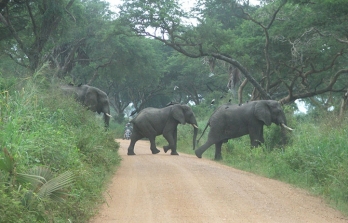 The Majestic African Elephants crossing a road in Murchison Falls National Park
The Majestic African Elephants crossing a road in Murchison Falls National ParkDesperate to have to deal with the high costs of accommodation, which is one of the reasons as to why many Ugandans find it difficult to tour the country, the government has revoked the monopoly that the Madhvani group had over putting up lodging facilities around Murchison Falls national park, writes SADAB KITATTA KAAYA.
In a bid to promote local tourism, government has ended Madhvani group’s monopoly over lodging facilities in Murchison Falls national park, six years before the expiry of the group’s 30-year agreement.
According to the state minister for Tourism, Godfrey Kiwanda Ssuubi, the decision to review Madhvani’s 30-year concession in Uganda’s biggest wildlife sanctuary was reached about four months ago in order to open up to investors that can come up with facilities favourable to local tourists.
“Ugandans are still discouraged by the high cost of accommodation facilities in the park, and since we are prioritising localisation of our national parks and the tourism industry, we are encouraging communities around the parks to invest in the sector,” Kiwanda told The Observer.
Under its 1993 agreement with the then Uganda National Parks, the Madhvani group was given exclusive zones covering about 30 square kilometres from its Paraa and Chobe safari lodges. These, according to Kiwanda, were awarded as incentives given that Madhvani had risked to invest in the park at a time when the Lord’s Resistance Army (LRA) reigned supreme in the area, with their warlord Joseph Kony said to be lodging at what is the present-day Chobe.
“Ugandans raised concerns over the high cost of the facilities in the national park. We tried to engage them [Madhvani] to lower the costs which they couldn’t, and it is discouraging tourism. That is why we decided to open up to other investors because cheap accommodation is still a major challenge to local tourism,” Kiwanda said.
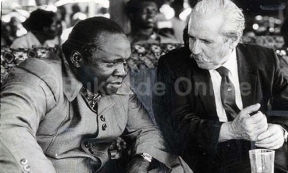
Former President Idi Amin who chased away the commercial Asian immigrants from Uganda.
Kiwanda spoke to The Observer after a stakeholders’ meeting at Paraa Safari lodge on January 11, where MPs from the six districts around Murchison Falls national park questioned government’s decision to give Madhvani preferential treatment.
The most vocal legislator was Buliisa MP Stephen Birahwa Mukitale who is constructing a 48-bed hotel on the Buliisa side of Uganda’s most visited national park. A guest at Paraa safari lodge has to pay $150 (Shs 540,000) exclusive of the costs a tourist has to pay to enjoy the game drives, nature walks or boat rides along River Nile.
There have been efforts to promote low-cost lodging facilities on the outskirts of the parks, on top of cheaper Ugandan food in order to convince Ugandans to visit tourist sites more. But those efforts appear to be meeting challenges, especially as holidaymakers seek quality facilities.
“We also still have problems convincing the tour companies to appreciate the value and importance of local tourism; many of them are thinking in terms of dollars. You can’t find traditional cuisines in these hotels, which is discouraging,” Kiwanda said.
Uganda Wildlife Authority (UWA) has so far signed concession agreements with three other investors that are going to construct a 40-bed hotel at Karuma, where Madhvani runs Chobe Safari Lodge, a 30-bed hotel at Gabongo forest and another at Butiaba escarpment.
But as UWA invites new investors, former Uganda Railways managing director Enos Tumusiime may lose his concession on Pakuba safari lodge, which he has allegedly failed to redevelop.
Tumusiime signed an agreement with UWA about eight years ago to redevelop the facility which was bombed in 1979 during the war that ousted Idi Amin.
“This hotel is historic. Amin used to spend his weekends here. Given that historic fame, we wanted an investor who would redevelop it but it seems the one we got has failed,” UWA executive director Andrew Sseguya told journalists outside what remains of the hotel.
Tumusiime is currently operating from what used to be the hotel’s staff quarters, leaving the main hotel structure to lions, leopards and hyenas.
THE NUMBERS
The new developments come after Murchison Falls national park registered an increase in the number of tourists visiting it with a notable increase in the number of Ugandans.
According to records at the park, 75,360 tourists had visited last December 31, 2016 as compared to the previous year’s 65,322 tourists. Foreign tourists accounted for 52.4 percent of last year’s visitors to the park while East Africans constituted 32.8 percent, and students 11 percent, resident foreigners at almost four per cent.
“The majority of those classified as East Africans are actually Ugandans. They are classified that way because all East Africans pay the same rates but nearly three quarters of them are Ugandans,” Simplicious Gessa, UWA’s public relations officer, told The Observer.
Kiwanda attributes the improved numbers of Ugandans visiting the national parks to his Tulambule campaign that he launched in August last year.
“I didn’t expect immediate results...by promoting local tourism, we don’t want to reduce the number of foreign tourists but the percentages of local tourists should go up,” Kiwanda said.
An estimated 1.5 million tourists come in every year, with the numbers expected to increase to two million, which Kiwanda says should be only a fraction of the tourists that visit the national parks.
“I want a 50 per cent increase of the local tourists and in this,” Kiwanda said. “I am looking at having Ugandans making up 70 per cent of the visitors to the national parks by 2020.”
sadabkk@observer.ug
Nb
Typical of neo-colonialism. The white man came and shot to kill these animals to heaven before realizing the national parks for themselves. He took over the parks so that he or she can make as much money as possible from expensive tourism. Now he or she want the natives to do the same in their own backyards.
Mukono Municipal Council in Uganda, Buganda has finally accepted to deliberate its official business in a native language of Luganda:
By Mike Musisi Musoke
Added 3rd June 2016
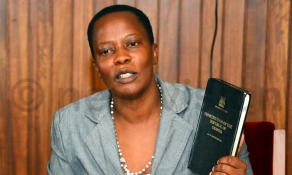 The Democratic Party Member of Parliament, in Uganda, Buganda M/s Betty Nambooze Bakireke
The Democratic Party Member of Parliament, in Uganda, Buganda M/s Betty Nambooze Bakireke
The idea was forwarded by Mukono Municipality member of parliament Betty Nambooze Bakireke who attended as an ex-officio member.
Mukono Municipal Council has resolved to conduct all its council meetings in Luganda for purposes of effectively embracing every councilor’s views. The resolution was on Thursday during the second council meetings convened to pass names of the executive nominated earlier by the Mayor George Fred Kagimu.
The idea was forwarded by Mukono Municipality member of parliament Betty Nambooze Bakireke who attended as an ex-officio member. She informed councilors that there is a provision in the rules of procedure allowing them to hold council in a language best understood by the majority of councilors for proper articulation.
"The idea is also to enable member in the public gallery who may be uncomfortable with English, to take in whatever is deliberated because it is their constitutional right", Nambooze said.
She however hastened to add that she should not be misunderstood as implying that councilors do not understand English, advising that those who do not understand luganda may feel free to air their views in English, with the Clerk to Council providing an interpreter where necessary.
In an interview after council, Nambooze told New Vision that in the region, it is only Uganda's parliamentarians that deliberate in English, adding that in Kenya and Tanzania, the mode of communication in councils is Swahili.
When the speaker Hamiat Nakigudde put the matter to vote, it was unanimously agreed that Luganda be the language of deliberation in subsequent councils.
Earlier, the speaker ordered youth councilors Patrick Sekatawa and Faridah Namatovu who had been elected two days earlier, to leave councilors’ seats and join the public gallery because they had not been sworn in yet.
She said, "I have not yet received communication from the electoral commission that you are part of my council, and until I receive communication to that effect, I cannot accept you as councilors".
The Mayor Kagimu n ominated Charles Lule Luyidde as Secretary for Finance and Planning, Peter Nsamba as Secretary for Works and Technical Services, and Madrine Madinah Nyumera as Secretary for Gender and Community Services, and they were unanimously accepted by council
MPANGA lyaali kkomera ly’Abaganda gye baasibiranga abasibe ab’omutawaana emyaka nga 200 edda, okutuusa 1927 Abazuunga nebazimba e kkomera LUZIRA.
By Musasi wa Bukedde newspaper
Added 26th May 2016
BW’OBA onyiize nnyo ntwala e Mpanga! Bwe batyo bwe baayogeranga ng’omuntu anyiize nnyo oba nga yeekyaye takyafaayo ku kiddirira!
Mpanga lye baali boogerako lyali kkomera gye baasibiranga abajeemu ne bamawale ab’omutawaana, wamu n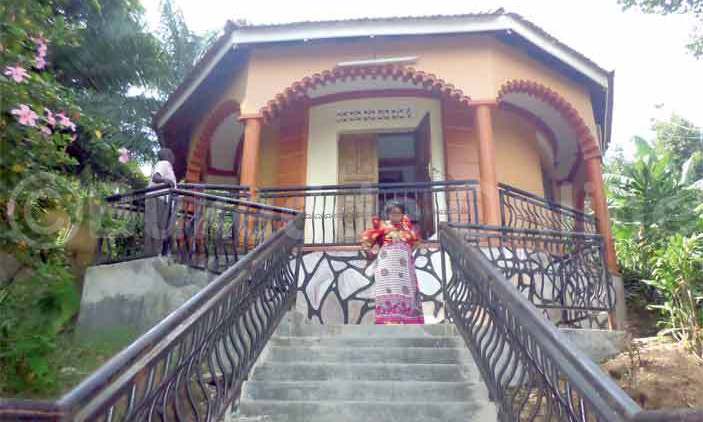 ’abaddu emyaka nga 200 egiyise.
’abaddu emyaka nga 200 egiyise.
Ekkomera lino lisangibwa Luzira okumpi n’ekkomera lya Gavumenti eddene, era Mpanga ye yazaala ekkomera ly’e Luzira!
Nnaalongo Nakate Namaalwa y’akulira ekkomera lino, Abaganda lye baafuula ekiggwa gye bagenda okusinza okusaba okusumululwa n’okulambula. Yakulira Luzira, naye kati mutuuze w’e Kitende ku lw’e Ntebe.
Musuubuzi mututumufu, alina kkampuni ya Emara Foods & Beverages esangibwa e Kitende, ekola juyisi ow’emiyembe ne wayini mu nnaanansi ne grapes (mizabbibu). Emizabbibu agisuubula Pakwach.
Mulimi wa lusuku, kasooli n’eddagala e Ssisa n’e Mpambire. Era ye nnanyini Emro supamaketi e Kitende.
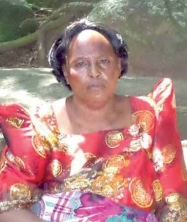
Nnaalongo Namaalwa akuuma ekiggwa kya Mpanga.
“Nze sikola mulimu gumu, ekimu bwe kisala ate ekirala kinziza engulu,” bw’agamba. Agamba nti obusuubuzi yabutandikira Luzira mu siteegi 6 we yalina edduuka eriguza abaserikale, abapoliisi n’Abazungu era okuva olwo tayawukananga na dduuka.
“Nasuubulanga Nairobi nga ntunda byonna okuva ku mata g’obuwunga, soda Masaba abantu gwe baali bettanira, omuceere gwe nasuubulanga e Busembatya, buli kyonna ekyabulanga mu Kampala ng’okisanga wange.
Nze nasooka okukola supamaketi e Kitende mu 1992 naye nga lyasooka kuba dduuka lya bulijjo. Obusuubuzi luli ng’okozesa ssente ntono naye kati okozesa nnyingi. Naye ekirungi bwe bakuseera ng’osuubula naawe oseera baguzi.
Naye bw’oba oyagala okufunamu tolina kuseera nnyo kuba bajja kukuddukako ebintu biremere mu masa,” bw’agamba.
Kyokka abantu b’e Luzira bamanyi Nnaalongo Namaalwa okuva mu 1978 ng’akuuma ekiggwa ky’Omusambwa Mpanga ogukuuma Luzira era okwava erinnya ly’ekitundu kino.
Okusinziira ku kitabo Bassekabaka ba Buganda ekya Sir Apollo Kaggwa, Mpanga gwe musambwa ogwakomya okusuubula abaddu mu Buganda kubanga baabayisanga Luzira ne babalinnyisa obwato okubatwala e Tanzania n’awalala.
Ebyafaayo biraga nti omusambwa guno gwakutula enjegere z’abasibe, ne gulwanyisa Abazungu abaali batwala abasibe Abaddugavu nga babasazeeko n’ennamba.
Olwo Abazungu ne basibirwa kati awali ekkomera ly’e Luzira eryatandikibwa mu 1927.
Olwo abantu bwe baayogeranga ku batabaazi abaasuuza Abazungu abaddu baagambanga nti, “Abasajja bano babadde bazira! Olaba babasuuza Abaddugavu ababadde batwalibwa!’ Kino kye baafuulafuula oluvannyuma lw’ebbanga ekyalo ne kiyitibwa Luzira!
E Luzira, ekiggwa kya Mpanga kiri ku kasozi mu Kamwanyi zooni. Ekiggwa kya mategula, olinnya amadaala nga 15 okutuuka waggulu mu kiggwa, omuli entebe emu yokka ng’eyaliiriddwaako eddiba ly’engo.
Ku mabbali we wali ekiggwa ky’omusambwa Nnaalongo, Nnaalongo Namaalwa gw’agamba nti gw’asamirira wamu n’abalongo baakwo.
“Kino kifo kitukuvu, bw’ojja wano ng’olina ekikusibye kyonna omuli ebizibu ebya buli kika owonerawo. Wano we basumululira enjegere. Tojja kusangawo ‘mayembe’ ganyeenya oba agoogerera mu nsuwa nga bataddemu mmota okufera abantu.
Wano tewasibwa, ayagala y’ajja n’akola ebibye n’agenda. Bw’ojja wano toyinza kusigala kye kimu kuba waliwo amaanyi ag’enjawulo,” Nnaalongo Namaalwa bw’agamba.
Ekifo kinnyogoga nnyo, naye mmita nga ssatu ng’okivuddemu ate wookya! Oba ndowooza kiri ku nnyanja, ku kasozi ng’oyinza okilengera emyalo egiriwo nga Gaba, Mulungu n’emirala!
Nnaalongo Namaalwa agamba: Waliwo ebika ebyasibwa, nga byajeema mu ntalo z’eddiini ne biwagira Abazungu. Abazzukulu baabyo bali ku njegere, oli ne bw’agaggawala atya era ekitwala obugagga tokiraba.
Abalala bookya ebyobuwangwa naye era tebatereera. Naye oli bw’ajja wano, ayinza okunaaba ku mazzi g’ennyanja oba okunoga eddagala wonna ku nnyanja oba ku kizinga nga bwe kimulagirwa n’agenda n’awona.
Abantu bakimanye nti si buli kiseera nti olina kuwona na ddagala. Mu nsi muno mulimu amaanyi, naye kisinziira oganoonyezza wa?,” bw’agamba.
E Luzira abantu bangi bagenda ne bayooyoota ekiggwa kya Mpanga, era kiyonjo nnyo. Omutuuze John Katumba agamba nti omumenyi w’amateeka yenna bw’azza omusango n’agezaako ne yeesaaza mu mbuga ya Mpanga ne bwe buba ddi bamukwata.
Ajjukira olunaku Omulangira omu bwe yagezaako okusendawo embuga ya Mpanga, n’afuna ebizibu ebingi omuli emmotoka ye okukola akabenje, okukubwa emiggo egyabulako akatono okumutta era bwe bwakya teyagiddira!
Okumpi n’embuga we wali oluzzi lwa Muteesa, naye waliwo Omuzungu eyagula we luli n’aluziba!
Nnaalongo Namaalwa bamuzaala Bbiina, kitaawe y’e Andereya Ssempijja. Agamba nti kuva buto ng’ali mu mbuga ya Mpanga. Ayagala okulambula akuba essimu: Uganda: 0705491200.
Added 21st April 2016
KABAKA awabudde Abataka obutaddamu kutuuza nkiiko mu Masiro kubanga yagaggala okutuusa nga gamaze okuggwa.
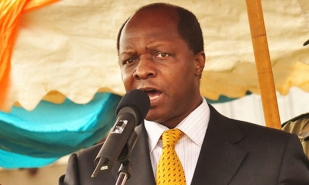
Kabaka w'Ensi Buganda ng'ayogera gye buvuddeko
KABAKA awabudde Abataka obutaddamu kutuuza nkiiko mu Masiro kubanga yagaggala okutuusa nga gamaze okuggwa.
Kino kiddiridde Abataka aboobusoloya okugenda mu Masiro ku Ssande ne batuuzaayo olukiiko nga bateesa ku nsonga ez’enjawulo omuli n’abasiige abava mu bika eby’enjawulo abateekeddwa okubeera mu Masiro.
Abataka baakulembeddwaamu omukubiriza w’Olukiiko lwabwe Omutaka Kayiira Gauule abalala kuliko Omutaka Muteesasira, Omutaka Walusimbi, Omutaka Mukalo, nga bali wamu n’akulira omulimu gw’okuzimba Amasiro, Joathan Nsubuga n’abantu abalala.
Abataka okugenda mu Masiro, baamaze kufuna bubaka kuva wa mukongozzi wa Ssekabaka Kintu, Sharifa Kirimuttu eyareese obubaka bwe ku bintu ebiteekeddwa okukolebwa ebika eby’enjawulo n’engeri gye birina okukolebwamu.
Oluvannyuma Omutaka Gajuule yagenze n’asisinkana omuwandiisi wa Kabaka ow’ekyama, Peter Mpanga n’amutegeeza ebibadde mu Masiro, wabula Mw. Mpanga m’amutegeeza nti Kabaka yabadde amaze okuwa ekiragiro eri Abataka bano obutaddamu kutuusa nkiiko mu Masiro kubanga yagaggala.
Kabaka era yayongedde okulungamya nti n’abantu ng’abakongozzi n’abagwa mu biti ebirala abaliko emirimu gy’ebyobuwngwa gye balina okukola mu Masiro tebateekeddwa kusulamu wabula bakole emirimu gino nga bava bweru w’Amasiro.
Kino kyaddiridde abamu ku bakola emikolo mu Masiro okwagala okusula mu Masiro okumala ekiseera kyonna okutuusa bwe banaamaliriza okugakola kyokka ne bawabulwa nti byonna bye bakola babikole nga bava bweru waago.
Omutaka Gajuule bwe yatuukiriddwa ku nsonga eno yagambye nti tayinza kugyogerako kyokka abamu ku baabaddeyo baakakasizza ebyabaddewo n’ekiragiro kya Kabaka ekyaweereddwa.
Mu kusooka, Abataka nga batudde mu lukiiko, omukongozzi Kirimuttu, yasabye omutaka Mukalo okuleeta essanga ly’e Njovu ate ne Mugema w’embiri addemu okugema Olubiri luno (Amasiro).
Abataka abalala baaweereddwa obuvunaanyizibwa obubakwatako nga Muteerasira yalagiddwa okuddamu okuluka ebizizi kuba Mugema teyakola mikolo gyali giteekeddwa kubikolwako nga tebinnawanikibwayo.
Bwe batuuse ku mpagi Sserugattika eyateekebwa mu Masiro, omukongozzi yategeezezza nti yasoba kubanga nayo Mugema teyagikolako mikolo.
Bino byonna biddiridde Kabaka okuyimiriza Katikkiro okuddamu okulambuza abantu Amasiro buli ntandikwa ya mwezi n’agamba nti, kino kiriddamu ng’Amasiro gamaze okuggweera ddala obulungi.
Nb.
Ensonga zino zandiggwa obulungi singa zitesebwaako mu Lukiiko lwe Ggwanga lya Buganda!
By Benjamin Ssebaggala
Posted: 2nd March 2016
KATIKKIRO w’Amasiro Ssaalongo Mulumba olwakutte omuzindaalo n’ategeeza Katikkiro Charles Mayiga nti obutassa kimu wakati w’abakungu abasomye n’abakola egy’ennono ziremesezza omulimu okutambula.
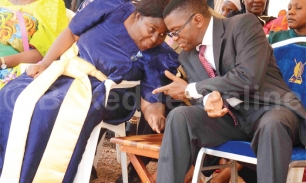
Katikkiro wa Buganda Mr Mayiga ne Nnaalinnya
Namikka nga beegeyaamu.
KATIKKIRO w’Amasiro Ssaalongo Mulumba olwakutte omuzindaalo n’ategeeza Katikkiro Charles Mayiga nti entalo wakati w’abakugu abasomye n’abakola egy’ennono ziremesezza omulimu okutambula.
Yamujjukizza nti omwaka oguwedde yategeeza Obuganda nti emirimu gy’abakugu gyali gikomye ng’egisigadde gya nnono kyokka n’okutuusa kati tewali kitambula.
Yamujjukizza nti ku mulembe gwa Ssekabaka Chwa ennyumba baagizimbira emyaka ebiri naye ku mulembe gw’abasomye kati emyaka 6 ennyumba eziηηamye.
Omuzindaalo yagukwasizza Nnaalinnya Namikka eyabadde omukambwe n’ategeeza nti mu Masiro wabaddewo enkaayana nnyingi olw’ekyuma abakugu kye bawanise mu kasolya k’ennyumba ya Muzibwazaalampanga ng’abennono bawakanya nti ennyumba eno terina kubeeramu busolya bubiri.
Abantu baabadde basiriikiridde nga bawuliriza n’agamba nti bo baabadde baagala kukiggyayo ne balemesebwa oluvannyuma ne basalawo okukiwanika waggulu basobole okutandika okusibayo ebizizi.
Wano yayanjudde Dunstan Mukiibi “Omukungu Mukiibi nkusaba oyimirireko bakulabe” yayimiridde olwo Namikka n’ayongerako nti:
Abammanyi obulungi bantegeera nti Kabaka ky’ayogera siddamu, mbadde awo Omukungu Mukiibi n’aleeta obubaka nti Ssaabasajja alagidde omulimu gutambule nga bwe guli naye mujjukire nti Ssekabaka Daudi Chwa bwe yali ayagala okuteeka akasolya ak’ebyuma ku Muzibwazaalampanaga abataka baamulemesa.
“Yasitula n’agenda ewa jjajjawe Nnaalinnya Damali Nkinzi n’amusaba amukkirize ateekeko ebyuma, kubanga Nalinnya y’akulira ennyumba eyo era yamukkiriza n’agenda mu maaso n’omulimu n’awanika ebyuma” Namikka bwe yannyonnyodde.
Olwamalirizza okwogera yatuddewo katono n’akuba Katikkiro Mayiga akaama oluvannyuma n’asituka n’agenda era Katikkiro yayogedde ye taliiwo ng’ali mw’emu ku nnyumba z’abakyala abali mu Masiro.
BAASOOSE KWEVUMBA KAFUBO:
Namikka ng’ali ne Mulumba baakwataganye n’abantu abalala ne basooka okwevumba akafubo ku nnyumba Kajjaga nga bali ne minisita w’obuwangwa Denis Walusimbi Seng’endo.
Mayiga yayingidde ng’akulembeddwa abeetisse ebita by’omwengo n’agenda mu Muzibwazaalampanga.
Omusenero yadduse anone Namikka n’akomawo nga tali naye oluvannyuma Minisita Henry Ssekabembe yagenzeeyo n’abanona ne bamala akaseera nga tebavaayo.
Nga batambula okugenda ewali Mayiga awo Mukiibi we yakubidde Namikka akaama. MAYIGA
AYANUKUDDE MULUMBA:
Yagumizza Obuganda nti e Kasubi emirimu egikolebwa gyegiri ne bwe babeera nga tebagiraba era munda waliyo ebitambula ne bwekubeera kukubaganya birowoozo era babeera bakola. Yagambye nti Omulimu gwa Katikkiro kuwuliriza n’ateeka mu nkola.
“Njagala okubagumya omulimu gw’okuzimba ennyumba tujja kugumaliriza nga tukutte ekkubo ettuufu” Mayiga bwe yaggumizza.
Bwe yabadde atambula okufuluma, Mulumba yamuwerekedde kyokka baatambudde ng’amuyombesa n’amulabula nti ajja kumukyawa kubanga emirimu gy’akola ate Mulumba agikubamu ebituli.
Bwe yayingidde mu mmotoka n’assa endabirwamu n’addamu okumugamba nti bw’obeera oyagala okundaba toyinza kumbulwa lwaki emirimu gya Kabaka ogisaabulula!
Abeetabye ku mukolo Nnaalinnya yabagabudde ekijjulo nga basiibula.
By Musasi wa Bukedde
Added 4th February 2016
Guno mulundi gwakubiri mu bbanga lya myezi etaano nga paasipoti ziggwaawo nga ne mu mwaka oguwedde mu mwezi gwa August, zaggwaawo, ne kiwaliriza minisitule y'ensonga z’omunda okutumyayo paasipoti endala emitwala 5 mu mwezi gwa October.
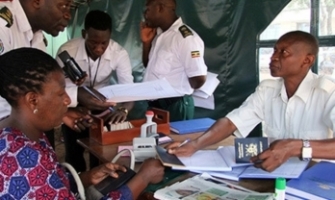
Abakola mu kitongole kya paasipoti ku minisitule y'ensonga
z'omunda nga batongoza enkola ya paasipoti eya 'Express'
omwaka oguwedde.
EKITONGOLE ekivunaanyizibwa ku bantu abayingira n’okufuluma eggwanga kiyimirizza okugaba paasipoti z'abantu baabulijo oluvannyuma lw'okuggwaawo nga baakuddamu okufuzifulumya ku nkomerero y'omwezi guno (February).
Guno mulundi gwakubiri mu bbanga lya myezi etaano nga paasipoti ziggwaawo nga ne mu mwaka oguwedde mu mwezi gwa August, zaggwaawo, ne kiwaliriza minisitule y'ensonga z’omunda okutumyayo paasipoti endala emitwala 5 mu mwezi gwa October.
Kino kyadiriri gavumenti okuyisi ennongosereza mu ngaba ya paasipoti bwe yaleeta enkola ya paaspoti ezigabibwa mu ssaawa 48 zokka, era kigambo kino kye kiviiriddeko omuwendo gw'abantu abazisaba okulinnya okuva ku 300 buli lunaku okudda ku 700 buli lunaku.
Omwogezi w'ekitongole kino, Jacob Siminyu, agambye nti, paasipoti ze basigazzaawo za bakungu zokka ssaako n'abantu abayinza okwagala okutambula eng'endo eziteewaliko omuli; okujjanjabibwa, okusoma, okwetaba mu nkung'aana ez'ensi yonna ssaako n'ensonga endala.
Siminyu era ategeezezza nti wadde nga batumizza paasipoti emitwalo 10 kati betaaga okwongera ku bungi bwazo buli mwaka okuva mu mitwalo 10 okutuuka ku mitwalo 20 buli mwaka okusobola okutuukagana n’obungi bw'abantu abeeyongera buli lunaku.
Wabula Simunyu atangaazizza nti wadde nga mu kiseera okutuuka bayimirizza okufulumya paasipoti, zaabulijjo (ordinary passport) abantu baddembe okugenda mu maaso nga bassaayo okusaba kwabwe okuzifuna (paasipoti) kuba bwe zinaaba zizzeemu okufulumizibwa kijja kubanguyira okukolebwako.
Amasiro Lwaki galuddewo nga tegaggwa kuddabirizibwa wano mu Bwakabaka bwa Buganda:
ABAKUNGU ab’enjawulo e Mmengo, Gavumenti eya wakati n’ekitongole kya UNESCO, boogedde ku kirwisizza omulimu gw’Amasiro g’e Kasubi, agataddangawo bukya ga ssirira muliro nga March 16, 2010, kakati emyaka 5.
1 Dennis Walusimbi Ssengendo, Minisita w’Ebyobuwangwa, Ennono n’Obulambuzi e Mmengo, agamba nti okuzzaawo amasiro kuluddewo kuba waliwo emikolo mingi egirina okukolebwa ku nju eno era bingi bikolebwa wadde tebirabika eri abantu baabulijjo.
Walusimbi agamba nti, “Ebintu by’Obwakabaka bikolebwa mu kitiibwa era bituula mu kitiibwa. Ekifuula amasiro gano ag’omuwendo, eky’ebbeeyi y’ennono n’obuwangwa ebigobererwa okugazzaawo. Abantu abaaliwo mu 1938, lwe gaasemba okuddaabirizibwa tebakyaliwo, ekizibuwaza okumanya buli kimu bwe kirina okukolebwa. Weesanga nga buli kimu kirina okutwala ebbanga okwetegereza.”
Ye Rose Mwanja, nga ye kaminsona avunaanyizibwa ku tterekero ly’ebyedda n’ebifo by’ebyafaayo mu ggwanga, agamba nti omulimu guluddewo kuba okuzimba Kasubi tekulinga kuzimba kibumbe ng’eky’essaawa ya Kkwiini. “Waliwo bingi ebitaalengererwawo nga tuteekateeka omulimu guno. Okugeza, weesanga nga bwe twatuuka okukola akasolya ne waggyawo okugoberera ennono ku bika by’Abaganda ebirina okukola emikolo egyenjawulo olwo ate ne tuddayo emabega okunoonya abantu abo. Kino kyayisa mu bbanga lya myaka ebiri gye twali tubaliridde okumaliriza Muzibwazaalampanga,” bwe yagambye.
Kyokka Mwanja musanyufu nti okusoomoozebwa kuno kuwadde abali mu mitambo gy’omulimu guno eky’okuyiga n’okwetegereza: “Tusobodde okuteekawo obuwandiike nga ssinga tufuna obuzibu mu maaso, tewaba kusumbuyibwa. Era tugenda n’okufulumya ekitabo ekiraga ebigobererwa mu kuzzaawo ekifo nga kino, okutendeka abaseresi abawera ne Gavumenti okwongera okumanya omugaso gwabwe.”
Ekitongole ky’ensi yonna ekikola ku nsonga z’Obuwangwa n’Ebyenjigiriza (UNESCO)ky’ekimu ku birambika engeri omulimu bwe gulina okukolebwa. Ne Gavumenti ya Uganda yawaayo obuwumbi bubiri kyokka akawumbi kamu n’ekitundu ke kaakozesebwa mu kuzimba ekisenge ng’endala Mwanja agamba nti zigenda kukola ku kusereka kyokka nga bandyongerayo ensimbi endala.
2 NAMIKKA NE WABULAAKAYOLE
Mu December 2012, Obwakabaka bwakola endagaano n’aba Omega Construction era okuzimba ne kutandika nga January 14, 2013 okutuusa March 2015 lwe yamaliriza okuzimba ekisenge ne wasigalira kusereka. Bwe kwatandika mu April 2015, waabalukawo enkaayana ku Nnaalinya Beatrice Namikka ne Wabulaakayole Christopher Kawooya, ku ani alina okufuna ssente z’okusasula, abaseresi (Bawabulaakayole) ng’ate Kawooya yali yafuna kontulakiti okuva ku Omega, okusereka. Kino kyatwala ebbanga nga kizingamiza omulimu.
3 Abagiriinya ne Namikka
Wabula okusereka nga tekunnaba, Abagiriinya, abavunaanyizibwa ku kuwunda enkata (ebizizi) essatu ezisooka okuteekebwa mu kasolya, baalina okusooka okuziwanikayo era omulimu ne guddamu ne gwesiba okutuuka mu July 2015.
Kigambibwa nti Namikka yayita mu omu ku Bagiriinya n’amugattamu abantu be abalala ne bakola ate n’Abagiriinya abamanyiddwa nga nabo bwe bakola. ‘Abatuufu’ olwamaliriza, nti mu kuteekayo ebizizi, Namikka n’addira ebyakolebwa abantu be nga bakuliddwaamu Eria Sserumpanise n’abiteekayo ate biri ebyakolebwa Abagiriinya ‘Abatuufu’ ne bisuulibwa ebbali.
Wano we waasibuka okubuusabuusa empunda y’akasolya era omulimu Namikka gwe yali awomyemu omutwe ogw’okusereka, gwakoma mu kkubo bwe yalagirwa aguyimirize, ebyakolebwa ne biseruukululwa nga July 12, 2015.
Omulimu guno gwali gutambudde era ssinga mu kiseera kino gutuuse ku mutendera omulala kyokka ensonda e Mmengo zigamba nti baali tebasobola kukkiriza bizizi byali bikoleddwa bantu batava mu kika kyonna mu Buganda (mbu nga Balugwala) ate ekirala, baali tebamanyi Namikka bye yasibira mu bizizi bino bye yali awanise mu kasolya.
Omu ku bantu mu Masiro (amannya gasirikiddwa) yagambye nti, “Namikka bwe yasabibwa okubiggyayo yagaana nti tekisoboka kubiggyayo naye ekibuuzo ekiriwo kiri nti lwaki tayagala biggyibweyo ng’ate waliwo ebipya ebyawundiddwa?”
Kyokka waliwo n’abagamba nti Kabaka bwe yagenda mu Masiro, teyalagirako nti akasolya kaseruukululwe wabula yalagira enjuuyi zombi; olw’ekikugu n’olw’ennono zikwatagane. Kyokka abeenoonyeza ebyabwe baagenda ne bawubisa Katikkiro Charles Peter Mayiga okuwagira eky’okuseruukulula akasolya.
Omu ku baakola ku mulimu guno (ataayagadde kumwogera linnya) yagambye nti, “Ebizizi ebyateekebwayo twamala okubikolera emikolo gy’ennono n’olwekyo tetusobola kuddamu kusuula bizizi bya Bakabaka okuggyako nga bigudde byokka olw’akabenje! Ebyo ebizizi ebipya ebikoleddwa mpozzi binaateekebwa ku byuma oba awalala anti bannaffe bagamba nti awali ebyuma ke kasolya kyokka sirabangayo kasolya katandikira mu bbanga okuggyako nga bazimba kibanyi!”
4 OLUKWE LW’OKULAGA MAYIGA NTI TASOBOLA
Katikkiro Charles Peter Mayiga nga yaakakwasibwa Ddamula, yagenda mu masiro e Kasubi n’awera nga bwe galina okuggwa ng’omwezi gwa March mu 2014 tegunnaggwaako. Kigambibwa nti waliwo abaakiraba nga Mayiga azze n’amaanyi mangi, ne kitabasanyusa.
Ekyasattuluza eby’okusereka kigambibwa nti Abalugwala be baali bakoze ebizizi, kyokka omulimu bwe gwaddamu nga waliwo ababalondoola nga bwe baagala, ekyebuuzibwa kiri nti, olwo lwe baafuuka Abaganda? Abaali bakola ku luli baali bambadde mbugo kati bambadde masuuti? We baasungala era na kati we basula, kiki ekyawukanye?
Ebizizi ebikyali waggulu byakolebwako emikolo, batta ente n’okuyisa omusaayi n’ebirala. Kirowoozebwa nti waliwo abaliko ‘eddene’ lye batunuulidde, era omulimu gye gweyongera okubeera mu bbanga, abakulu abaguli mu mitabo, gye bakoma okwongera okufuna ensako.
Ekirala, nti Mayiga b’ayita abantu be ab’oku lusegere, bamutomeza nti ebintu byakolebwa bubi olw’okwenoonyeza ebyabwe era nti aligenda okukigwamu nga buyise.
5 Ebika okulekebwa ebbali
Ebika tebyasooka kuteekebwa ku mwanjo mu mulimu guno era bingi nga bikulembeddwaamu Abalangira, Engo, Engeye n’ebirala byakaayana olw’obutaweebwa mukisa kutuukiriza buvunaanyizibwa bwabyo. Kino kyatwalira omulimu guno ebbanga nga tegutambula bulungi.
Waliwo omulimu lwe gwayimirira lwa buzibu mu nsimbi, okuwa Pius Mugalaasi kontulakiti, okugula ebintu eby’enjawulo n’okusasula abakozi.
6 Olw’okuba omulimu ogukolebwa gwa buwangaazi, gwayimirira ebbanga lya myezi ena nga balindirira langi okuva e Girimani okusiigibwa ku byuma by’akasolya.
7 Okunoonya n’okufuna ebikozesebwa ku nju eno, kisangiddwaamu obuzibu naddala emmuli, ebinsambwe n’obwegendereza obwatwalibwa abakugu mu kuzimba enju yennyini.
8 Okulwanira obukulembeze bw’Amasiro gano wakati wa Bannaalinnya; Beatrice Namikka ne Getrude Tebattagwabwe, ku ani alina okubeera Nnaalinya w’Amasiro, nakwo kwaleeta emirimu obutatambula mangu.
9 Pulojekiti eno ekolebwa enjuuyi ssatu nga zonna zirina okukkaanya ensonga okugenda mu maaso okuli Obwakabaka bwa Buganda, Gavumenti ya Uganda n’ekitongole kya UNESCO. Wano wabaawo okuteesa kuyitirivu, okuwakana n’emitendera okusinga oluuyi olumu bwe lubeera nga lwetengeredde.
BUGANDA CULTURE AND LIFE STYLE (ENNONO)
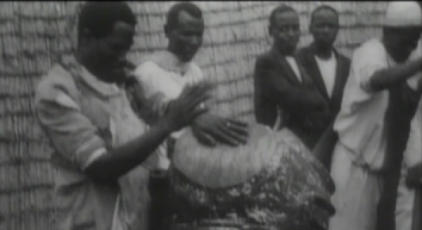
Engoma nga zivuga kumazaalibwa ga Ssekabaka Muteesa II
nga era awasa Catherine Damali Nakawombe, 19, November 1948.
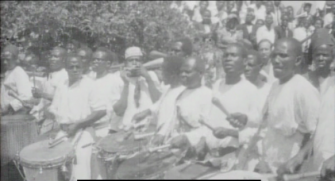
Essanyu ly'Obuganda eri Ssekabaka Muteesa II
1962 nga Buganda yefuga.
Enjawukana mu bika: Abataka bakoonaganye mu maaso ga Kabaka Ronald Muwenda Mutebi
Jul 07, 2014
Kabaka ng’alambula omudaala gwa Mugema ow’e Kawaala.
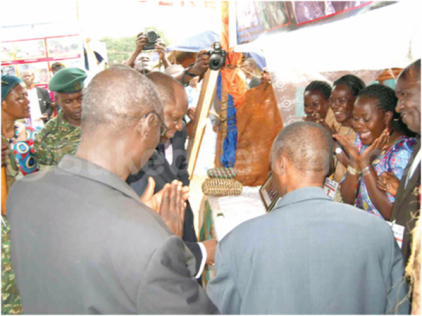
Bya Lilian Nalubega
OBUGULUMBO mu bika by’abaganda omuli ensowole n’abantu abatali bamu abaagala okubikulembera bwongedde okulaga obutatya bw’abaganda eri Kabaka.
Kino kyeragidde mu ngeri ab’ebika ebimu bwe beeyisa ne mu maaso ga Kabaka. Kyennyamiza okulaba ng’abakulembeze b’ebika ab’enjawulo bavaayo okweyoleka mu maaso ga Kabaka nga bamanyi bulungi nti balina okukontana mu bukulembeze bw’ebika byabwe kyokka ne bamweyoleka era nga buli omu amweyanjulira nga Omukulu w’ekika.
Kino kyeyolese lwatu mu mwoleso gw’ebyobulambuzi ogwabadde mu Lubiri e Mmengo.
Abataka abakontana mu bika baayolesezza bulungi bo bye bamanyi nti byabuwangwa bya bika byabwe abaana n’abazzukulu baabwe bye balina okumanya n’okusobola okumanya obulungi ebifa ku bika byabwe.
Eby’Ekkobe byazibuwadde
Ekika ky’ekkobe kyewuunyisizza abantu abataka okwabadde Omutaka Augustie Mutumba abangi gwebamanyi nga ow’eMakerere yayolesezza kyokka ne munne Joseph Byekwaso n’ayolesa.
Ebyafaayo biraga nti omutaka Mutumba yawoza omusango gw’obukulu bw’ekika ky’ekkobe mu kkooti ya Kisekwa emyaka kumpi 15 egiyise n’agusinga wabula ate abaasingibwa omusango nga bano be b’oludda lwa Byekwaso nabo ne basigala nga bagamba nti tebaamatira era bamanyi be bakulu b’ekika kino abatuufu.
Mu mwoleso Byekwaso ne banne baaleese omudaala gwabwe kyokka baasanze okusoomoozebwa okw’ekitalo bwe baakedde ku makya Kabaka lwe yaguggaddewo omwoleso ne basanga omudaala gwabwe nga gusimbiddwamu ebiti nga n’ebintu bye baabadde bategese ebimu bitwaliddwa wabula ne bafuba ne baguzzaawo wakati mu kusika omugwa n’abamu ku bategesi abaabadde babagaana okuguteekawo.
Enkima yabadde n’emidaala 2
Bo abenkima nabo baasasamazza abantu kubanga bazzukulu ba Mugema ow’e Kawaala be baasooka okwolesa okuviira ddala ku ntandikwa ng’omwoleso gutandika wabula ku nkomerero bazzukulu ba Mugema ow’e Bbira nabo baaleese ebintu byabwe era nga baabadde baagala kwezza mudaala gwennyini omwabadde ab’e Kawaala. Wabula bano baasanze okusoomoozebwa kubanga ab’e Kawaala baabadde bavumu ne babalemesa.
Okusinziira ku bamu ku bataka abataayagadde kwatuukirizibwa mannya, ebyafaayo biraga ng’eyali Mugema omutuufu yali ava Bbira nti kyokka mu kuwang’anguka kwa Ssekabaka Muteesa, Mugema eyali amanyiddwa nga Kaamulegeya eyaliko mu Kiseera ekyo yasituka n’alayira ng’agamba nti Muteesa bw’akomawo bamutemako omukono.
Nti kyokka ekyamuggya enviiri ku mutwe Kabaka Muteesa kwe kukomawo. Kye yali yeeyama okutemwako omukono Kabaka yagaana okukikola olw’okuba ye yali muko w’embuga era n’alagira okumubonereza obwamugema bumuggyibweko n’olunyiriri lwe bafune olunyiriri olulala mwe baba baggya mugema era kwe kusalawo ne balonda mugema ava e Kawaala.
Kabaka yalambudde emidaala gy’ebika era kumpi gyonna yagituuseeko buli bamu nga bamusanyukira byansusso awatali kufa ku butakkaanya bwe balina na kulowooza kw’ani yayolesezza.
Eby’Ensenene nabyo tebyategeerekese
Kyo ekika ky’enseenene kyayolesezza kyokka nga bazzukulu ba Mugalula e kisozi be baabaddeyo. Bano bategeezezza nti basanyufu okulaba ng’ekika kyabwe abategesi bakimanyi nti gy’ekiri era nga kuno kwe baasinziira okubayita beetabe mu mwoleso.
Bano newankubadde baabaddewo nnyo abamu ku bataka n’abantu bakira babasongamu nga bagamba nti Mugalula si mukulu wa Kika kya Nseenene era nti Kabaka yalagira adde ewa Kalibbala ng’essiga mu kika ekyo ekintu kye yagaana ng’agamba nti ye wa kika ekyeetongodde era naye yabaddeyo mu mwoleso guno.
Katikkiro Mayiga bwe yali alambula omwoleso guno, yasanga emidaala gy’abekkobe ebiri era mu kwogera kwe yalabula nti tewali bika birina ba busolya babiri wadde bakatikkiro era n’abawa amagezi nti tebasaana kukola bintu bityoboola bwakabaka.
Abalangira beemulugunya olw’obutafiibwako
Buganda | Jul 07, 2014
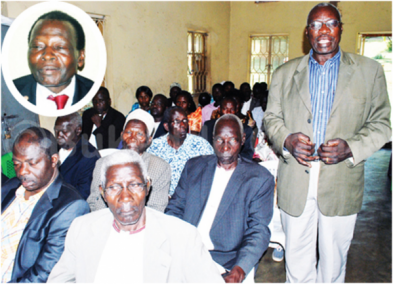
Abalangira nga bali mu lukiiko. Mu katono ye Mulangira Kayima.
Bya Job Nantakiika
ABALANGIRA n’Abambejja ba Buganda bennyamivu olw’engeri gye batafiibwako ng’Olulyo oluvaamu Kabaka.
Abantu bano abaakung’aanidde mu kigango kyabwe e Namirembe ku Lwomukaaga baawadde ekyokulabirako nti emirundi egimu emikolo egitegekebwa mu Buganda tebaweebwa kifo kitongole waakutuula era oluusi omukolo gwonna guggwa tebalagiddwa Kabaka we bali kubabuuzaako.
Ssaabalangira Moses Kayima yannyonnyodde nti awandiise amabaluwa mangi ng’asaba okususinkana Kabaka nti kyokka tafuna kuddibwaamu kwonna ekiraga nti amabaluwa gano tegatuuka ku Kabaka kusobola kumusisinkana.
Abamu ku Balangira n’Abambejja abaabadde abanyiivu baaleese ekiteese basituke mu kiseera ekyo bagende ku Bulange mu ngeri y’okwekalakaasa balage obunyiivu bwabwe kyokka abalala ne bagaana enteekateeka eno kubanga baabadde tebeetegese ne basalawo bakikole olulala nga bonna beeteseteese.
Ssaabalangira Kayima yannyonnyodde obukulu bw’olulyo Olulangira mu Bwakabaka n’ategeeza nti mu kiseera kino, Kabaka ali mu bbanga olw’enkola eng’enderere okumwawukanya ku baganda be olw’ebigendererwa ebitamanyiddwa.
Abalangira okulaga obwennyamivu olwa Mmengo okwagala okubawukanya ku muganda waabwe, baateeseza besibye ebiwuzi. Kayima yayongeddeko nti olw’obukulu bwa Ssaabalangira mu Buganda, y’akwasa Kabaka omuggo oguyitibwa ‘Ssegulira ennume’ okulaga obukulu.

Katikkiro Charles Peter Mayiga addresses his Lukiiko
in the Kingdom Parliament of
Culture.
PHOTO BY Abubaker Lubowa.
Posted Tuesday, May 12 2015
Two years since your appointment by Kabaka Ronald Mutebi II as Katikkiro, how have you found leading a cultural institution like Buganda?
Well, I think all forms of leadership have challenges. I don’t think you have to be a leader of a cultural institution to face challenges. Any leader worth his salt is going to face challenges. So we get challenges but also good moments.
The perception out there is that Buganda’s relationship with the central government has improved, is it because of your leadership style… what has changed?
It is not solely about my leadership. I think it is a combination of many factors but as an individual, I don’t think constant agitation is the way to go about matters over which people may be disagreeing. I don’t think it bears much fruit. First of all, I am very firm in my conviction as far as the interests of the kingdom are concerned.
I wouldn’t depart from them but that doesn’t mean I must agitate all the time. I am a leader, not an activist. There is a huge differencebetween the two. May be because of that and other factors, which I may not go into now, I think it has probably contributed to the relative calm between the central government and us (Buganda Kingdom government).
Do you think Mengo has taken the best direction?
The kingdom is characterised by many things, and expectations of the people we lead take different dimensions. It is not only about politics. People expect the kingdom to deliver social services.
People have everyday concerns; issues like unemployment are very much alive, issues like health facilities, educational institutions, food production and money in their pockets. There are very many issues which matter to people and an institution of 1,000 years like the Kingdom of Buganda, in my, view must find ways of addressing some of these issues.
So what is the kingdom doing about the aspirations that you talk about?
Let me explain the Ensonga Ssemasonga Ettaano (Five major Points) because that is what crystallises what the kingdom stands for: We thought it prudent to crystalise our interests and it is from them that we draw working programmes. The first tenet is the integrity of the Kabaka and of our heritage because the Kabaka and our heritage are the rallying points.
The second tenet is sharing power under a federal system of government, the third is the integrity of the boundaries of the kingdom of Buganda and protection of land, the fourth is hard work and the fifth is unity of the people of Buganda irrespective of whatever differences they may have, whether on a political, religious and ethnic front because Buganda is a collection of many people.
So, it is from those five tenets that we draw the programmes and those five tenets we believe crystalise our interests. So people should know we have not given up on the struggle for federalism. By the way, federalism is not supposed to re-establish what you people call Buganda’s privileged or favoured kind of talk, by the British. That is not true. The Baganda were smart in how they worked with the British.
You hear people talk about collaboration, that Buganda kings were collaborators, therefore sellouts to colonialism. What nonsense?
The British worked with Buganda, they started from here because Buganda was the most organised. So when you work with a nation that is most organised, it makes it easier to work with the others.
They didn’t sit in the colonial office and say we favour Baganda because of the way they laugh or the way they dance. Why should they have favoured Baganda?
Colonialism was not some kind of a resort where you go for a holiday and you choose where you want to go, the price range, the weather, (and) the hospitality.
Colonialism was about exploitation, extraction of value, making of profits and it was prudent to start in Buganda and Buganda kings were smart to know that these people had superior technology and even if you are going to fight them, they are just going to destroy you mercilessly, so it was prudent to work with them and that is what saved whatever was saved of our heritage. I find those arguments naïve to be honest (Laughs……)
Reflecting on Buganda history, what has changed from let’s say the time of Sir Apollo Kaggwa to date when you are Katikkiro and where is the kingdom headed?
Of course, a lot of things have changed.
Apollo Kaggwa was Katikkiro during the time when Uganda as a country was being formed by an external power, the British. I am Katikkiro during a time when Uganda is an independent country with a national government.
The interests of the colonial state were different from the interest of the independent state of Uganda. The dynamics have changed a lot but what hasn’t changed is the fact that Buganda happens to be at the centre of everything. I think Buganda
Buganda was the cornerstone upon which the country Uganda was built, today Buganda is the heart of Uganda, to a large extent.
So to a large extent, those factors are still the same and I think Buganda has a big influence to the political, social and economic landscape of Uganda. Apollo Kaggwa was charged with a responsibility of ensuring that the kingdom does not lose out, that the kingdom stays around and alive. My responsibilities are to ensure we resurrect the aspects that made us strong in the past and as far as I am concerned, they are the people of Buganda, make them appreciate their heritage, be proud of it and to get them involved in sustaining and promoting it.
And how are you going to make sure that the people of Buganda realise this?
The first step for me is to make people realise that the kingdom has to have resources to address the socio-economic concerns of the people.
I will draw the example of the church, if the church were to depend on spiritual emancipation, I don’t know, if that exists, the church would be in trouble, that is why where you find a church, you find a hospital, a school. When you go to Rubaga (seat of Catholic Church), there are about 10 schools run by the church, a hotel, a housing estate.
There are all sorts of social and economic activities carried out to deal with the day to day needs of the people. Of course, on top of the hill, there is a cathedral, which is a symbol of the spirituality of the church.
So the kingdom is about our heritage and the Kabaka is the custodian of our heritage. We are proud of it but I know that young people must be employed. I am talking about people who are educated, what about those in the villages, people must have food.
I have traversed the entire kingdom and witnessed poverty that can be a tourist attraction. People must have food, they must not share their houses with animals, and they must drink safe water. They must have an income and that is why I say everybody above the age of 18 who does not suffer any bodily infirmity must earn at least one dollar a day.
Human dignity is the bedrock of political freedom. So where do I start? I start by sensitising the people about this need. I think people are taking heed that is why they welcome me in large numbers wherever I go.
If that was not the case, they wouldn’t be there. That is why when I say let us contribute to our development plan, they give me the money. In two years we are soon climbing to Shs8b, I think people are realising this.
When Kabaka was in Buruli, he distributed about 40,000 coffee seedlings; he treated through the health camps more than 3,000 people. That is extremely important. How are you going to preach federalism to sick people, to people who eat one meal a day?
So the bedrock of political freedoms is human dignity and human dignity starts with having enough to eat and leading good health or being able to take children to school.
And once people are able to do that, they will definitely demand for political freedom. Like I told you at the very beginning, we have crystalised our interests and federalism is very much part of the bigger picture.
As you move to the different parts of Buganda, young people, especially are excited, they contribute money but are they putting in practice what you preach?
I receive a lot of reports from the county chiefs. I speak to a lot of opinion leaders.
I interface with the people, and yes, the people are taking heed. The first time I went to Mawogola, the Kabaka told me to tell the Baganda there to learn from the Banyankore in the area who keep cattle for a livelihood.
When the Kabaka went there to celebrate his 21st coronation, the county chief told us about the Baganda who were starting cattle keeping because they own the land but all they were doing was to sell it to those people who know about cattle keeping. Cattle keeping is not rocket science. How can it be so hard to look after cattle?
I have met so many young people who have talked to me. A young man came here and told me that he had started a piggery business, the other told me he started a banana plantation, another named Bbale came and told me he started a small shop selling telephones in Masaka. I think people listen.
If you talk to 10 people and two take in what you have said, you have scored, eventually the message will catch on.
But do the chiefs on the ground propagate this message?
Yes, and we have started gauging how they carry out our programmes at county level. The county which scores highest receives the Kabaka. This year, Kyagwe will receive the Kabaka on May 30 during our Buganda local government day. Kyagwe scored highest and seeing the reactions of others who did not come first, it is good and we are going to continue with it to ensure that we simply don’t talk.
Buganda might be having a working formula but without the resources, are you tapping into the various government programmes?
Yes for sure. When the Kabaka was in Kyagwe for Obulungi bwansi, we got 25 million tree seedlings from National Forestry Authority, a government agency. We got about 300,000 coffee seedlings from Uganda Coffee Development Authority that is another government agency.
I told you that the Kabaka treated about 3,000 people in Buruli, some of the drugs came from National Medical Stores in Entebbe and that is a government agency.
Yes, we work with government on many fronts and both of us work for the same people. The Kabaka told us when he was in Bugerere last year to work with the central government on issues that enhance people’s wellbeing. That’s what we are trying to do. We all serve the same people.
What milestones has the kingdom reached under your stewardship?
Kasubi Tombs are nearly complete. There is more unity in the kingdom. The Kabaka has visited all counties. The Kabaka has gone to Bugerere and Buruuli. You cannot be a head of the home and there are some rooms in the house you are forbidden to access. We have also created a professional working environment at Bulange.
We have streamlined offices and departments. We have merged some, and created new ones. For example, we have a tourism promotions board to help us rebuild and market Buganda tourism. We also do partnerships with the private sector using a professional company, Majestic Brands. That is why you saw companies like Airtel, Postbank here at Kabaka’s birthday anniversary.
People see us out there with Ettofaali project but I think internal changes are one of the biggest milestones. We have so far succeeded 40 per cent in professionalising this place...We now know who works here, and they can be identified. We have introduced the office of Kalondozi (auditor general) to help accountability. Transparency is one of the tenets of my leadership.
Your critics say you are in bed with government, and you have ignored the plight of fellow Baganda politicians who are persecuted by the government. Case in point is Erias Lukwago, who was recently locked out of the City Hall while you smiled for the cameras with Jennifer Musisi.
I am in bed with government! That’s the most hilarious thing you have said today [laughs]. Well, I have told you that my job is to lead, I am not an activist. My job is to preserve and defend the kingdom interests. Anyone with the kingdom interests at heart, I work with them. I don’t look at which party they come from. However, anyone who antagonises our interests as a kingdom, I do not entertain them. I have worked with the Lord Mayor on several things, and he has only been free to speak to his voters when he is with me.
However, what I will not accept is anyone to think their political interests are necessarily the interests of Buganda. I advise the Opposition to look at the many weaknesses of government and point them out. How do MPs like [Geofrey] Ekanya, Reagan Okumu, Abdu Katuntu come to Parliament? Do they first talk from cultural institutions offices in their areas?
When I was invited to KCCA by Jennifer Musisi, I did not go there with political intentions. And even if I had taken Lukwago with me to City Hall, I don’t have powers to reinstate him in his office.
Recently, Sheikh Muzaata criticised your popular fundraising scheme ettofaali saying poor people are failing to fundraise money for more important projects in their communities such as schools, churches and mosques. What do you make of his concerns?
People know I am raising money for projects of the kingdom, not my projects. We want a self-sustaining kingdom. I have also never stopped anyone from fundraising for community projects.
In fact, I will support Sheikh Muzaata if he fundraises for mosques. I was surprised that he made those comments. I focus on the bigger picture not individuals.
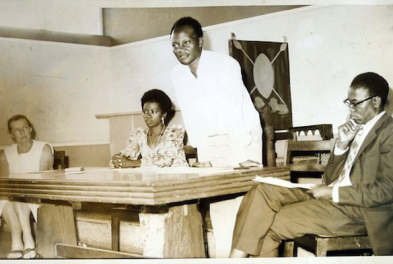
Playwright Byron Kawadwa (2nd R) with some of his
colleagues in the 1970s.
By Henry Lubega
Posted Saturday, June 6 2015
Sarah K Birungi, a retired secondary school head teacher and actress with the Kampala City Players was part of the cast of the famous Oluyimba lwa Wankoko, (Song of the Cock), which was staged in Nigeria at the Festac Festival in 1977.
Birungi was drafted into the group from Nabisunsa Girls School where she was teaching and had produced a number of plays staged by her students. In Oluyimba Lwa Wankoko, she acted as one of the many wives of King Wankoko in his palace.
“I was brought on board to act with Kampala City Players by Elephania Zirimu, who was teaching at the National Teacher’s College, Kyambogo. When I joined the group, we were to do rehearsals for the play from the National Theatre’s Greenroom, from 5pm to 7pm. However, as the festival got closer, the rehearsal intensified, forcing us to rehearse from 6pm-10pm, this time on the stage to get used to the lights, stage exits and entries.”
Having joined the group from her teaching job, Birungi was not privy to the selection process to know how Oluyimba Lwa wankoko was selected. Four dress rehearsals were organised for the public and government officials to watch the play before it was staged at the Festac in Nigeria.
“The government facilitated our trip right from procuring passports, paid the transport and upkeep during our stay in Nigeria. Though it was a Luganda play, the audience in Lagos understood the message in the play.”
Oluyimba Lwa wankoko was believed to be a critic of politics at the time, a thing that may have cost Kawadwa his life. “At first I thought the play was a social satire, but after some time and listening to what people were saying about it, I realised it was a political satire. The leader and the led were being represented by Wankoko and Wankwale. Wankwale, with his many tricks, was often trying to outwit Wankoko.”
Last days
There have been reports that Kawadwa was picked from the National Theatre during rehearsals, however, according to Birungi, it was not the case. “A few days after our return from Lagos, we met at the Arts Club within the National Theatre to review the trip and the performance while in Lagos. It was during the review meeting that someone came and beckoned Kawadwa that someone wanted to see him outside. Shortly afterwards, we heard people wailing. When we went to find out what was happening, we were told that Kawadwa had been put in a car boot and driven away. Shock and grief filled the National Theatre. We did not know what to do. The meeting ended there. We walked away in fear- both for our lives and Kawadwa’s.
A few days later, his body was discovered in Namanve, from where it was picked and buried in Kisasi, a Kampala suburb, his home area.
Given the manner of his death, only a few people attended his burial. Only those who could be reached by word of mouth attended the burial. There was so much fear that some mourners failed to go to his home
After Kawadwa’s death, the group never met again. Personally, I returned to my teaching job.
For the time I interacted with him, he was a very humorous person, dedicated to his work.
lubegah@ug.nationmedia.com
By AMOS NGWOMOYA
Posted Thursday, July 9 2015
KAMPALA,UGANDA;
This country has become a State party to the United Nations, Educational, Scientific and Cultural Organization (UNESCO) Convention on the protection and promotion of the diversity of cultural expressions.
Speaking at a press conference yesterday at the Media Centre, the State minister of Gender and Cultural Affairs, Ms Rukia Isanga Nakadama, revealed that Uganda becomes the 139th country to ratify the convention after depositing the instrument of ratification with the Director General of UNESCO on April 8, 2015.
Nakadama said this is the third UNESCO Convention that Uganda becomes a State party to after subscribing to the Convention on World and Cultural Heritage (1972), and the Convention for safeguarding of the Intangible Cultural Heritage (2003) which Uganda ratified in 2009.
“The UNESCO Convention on the protection and promotion of the diversity of cultural expressions is a legally-binding international agreement that ensures artists, cultural professionals, practitioners and citizens worldwide can create, produce and disseminate and enjoy a broad range of cultural goods and activities, including their own,” said Ms Nakadama.
She also revealed that the benefits of ratifying the convention include; strengthening cultural industries by facilitating wider access to global markets, capacity building through exchange of information, provision of incentives through the transfer of technology and knowhow and education and public awareness and participation in committee meetings.
“This convention shall help Uganda pay adequate attention to this path of economic growth especially for the many talented Ugandans who cannot be absorbed in public service or who have not attained higher education but can use their talent to generate income and also boost employment,” remarked Rukia Isanga Nakadama.
The ratification of the convention comes at a time when Uganda has just launched its National Development Plan 2015/16-2019/2020, a thing that has prioritised the creative industries, which are part of the cultural expressions in the country.
Uganda has also developed a creative Economy Action Plan to operationalize the interventions in the National Planning Framework in order to domesticate the Convention at the National level.
editorial@ug.nationmedia.com
Posted Friday, September 4 2015
Rakai, Uganda:
A 19-year-old father has disowned his two-and-half-year-old daughter for having two sexual organs.
According to the mother of the child, Ms Dorah Namirembe, 18, a resident of Nabyajjwe village, Lwankoni Sub-county in Rakai District, her husband, Alex Kiryowa, abandoned the family upon learning that their daughter had started developing a male sex organ at nine months.
She says she went for an ultrasound scan during her pregnancy, and the baby was clearly identified as a girl.
According to Ms Namirembe, the baby was born in September 2012 with only a female sex organ.
“After delivery, my husband gave her a name but we were shocked to see her developing a male organ,” she says. She explained that at only two-and-half years, the girl started growing pubic hair around the male organ, adding that both organs are active.
She said she took the girl from one herbalist to another seeking help until she ran out of money. After trying in vain, Ms Namirembe decided to visit different clinics and hospitals in the district and later was advised to go to Mulago National Referral Hospital in Kampala for further consultation.
At Mulago, doctors said her daughter has to undergo various tests. The girl’s grandmother, ms Fedelesi Najjuma, said she took care of the duo since there was no one to financially help them. She said they are stranded since they cannot raise money to address the girl’s abnormality and fellow residents ostracise them.
A medical specialist at Masaka Regional Referral Hospital who preferred anonymity said the girl’s situation is difficult to understand since both organs are active.
He explains that the more the girl grows, the more the problem might become difficult to handle.
For help
For assistance. For Birabwa’s case, the doctor advised the family to solicit for money from good Samaritans to have the girl undergo a special surgery. For any assistance, support or advise, you can reach the family on 0787 093284.